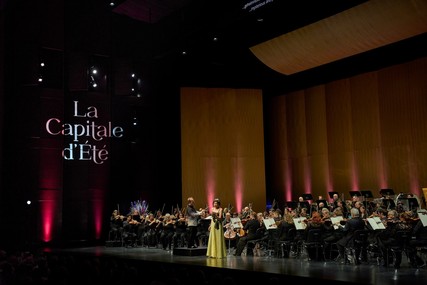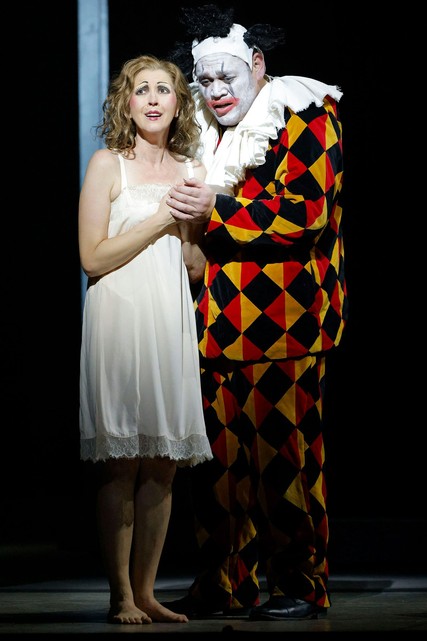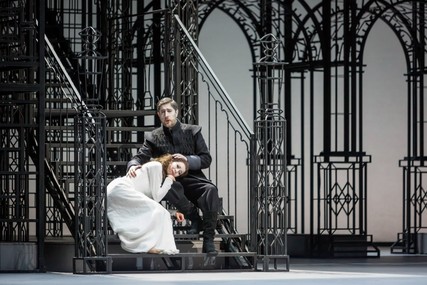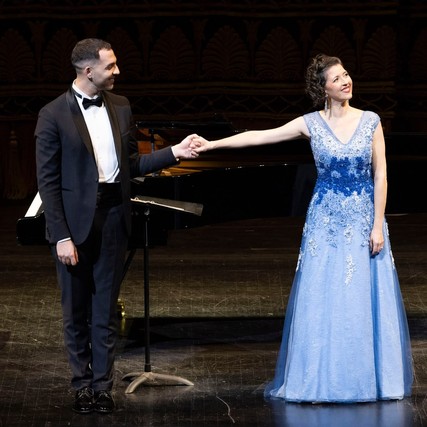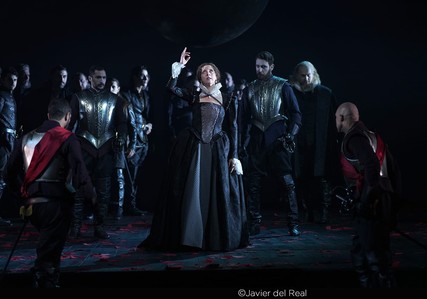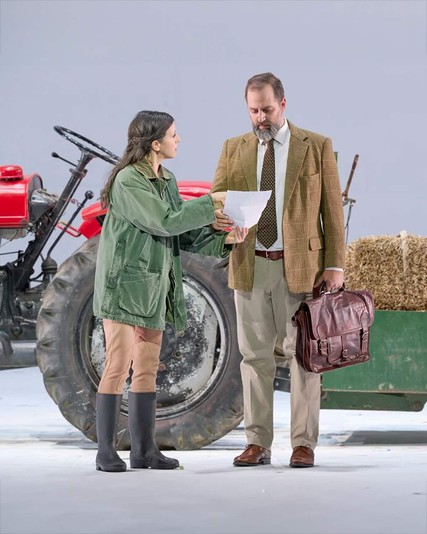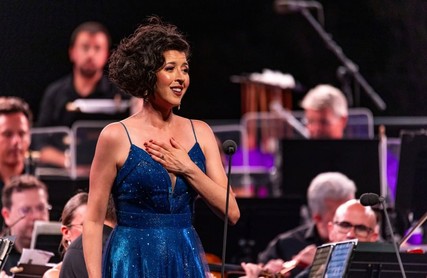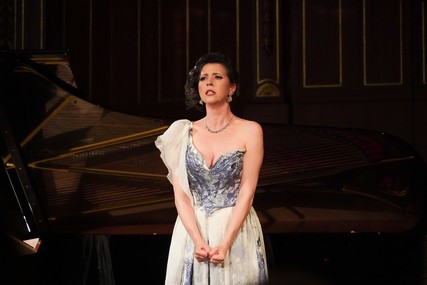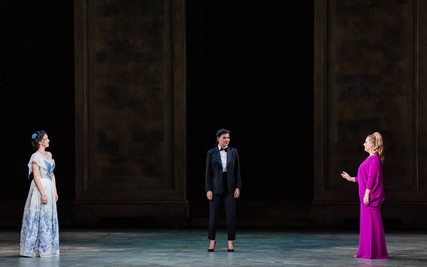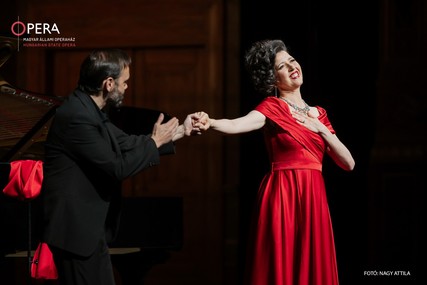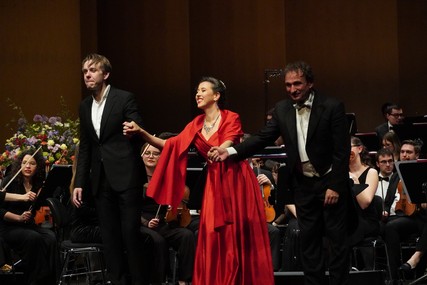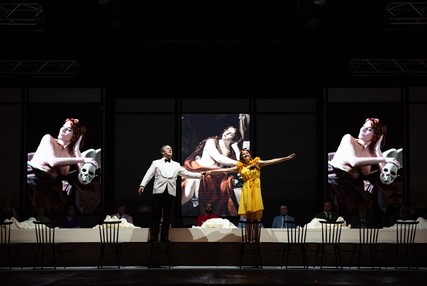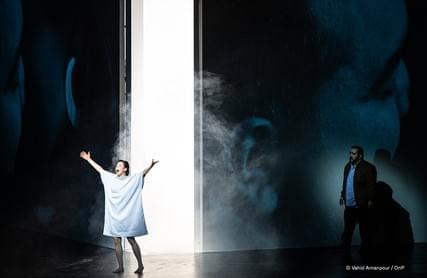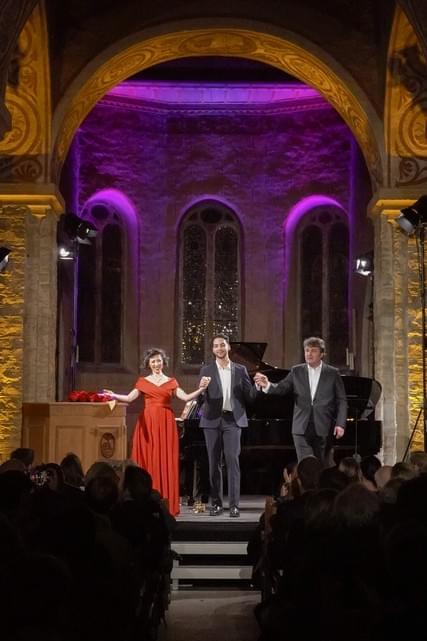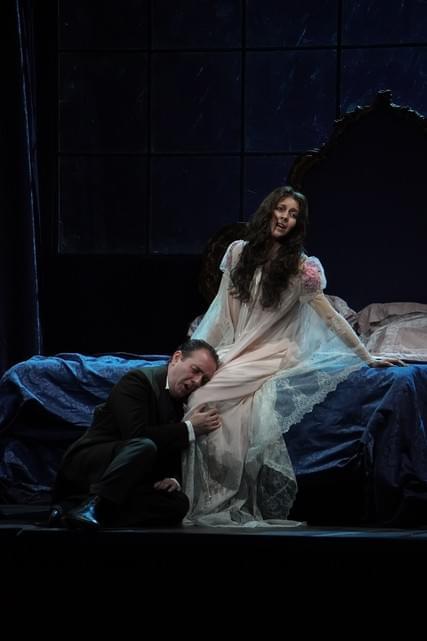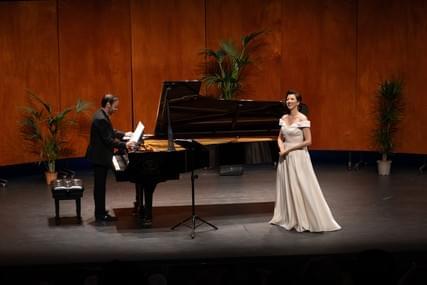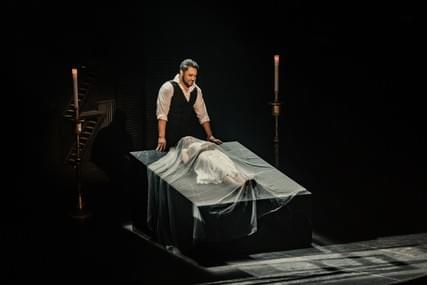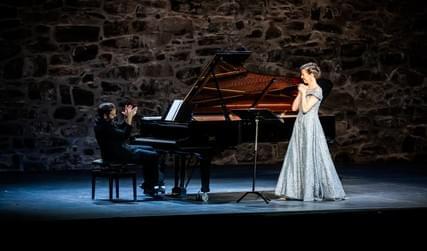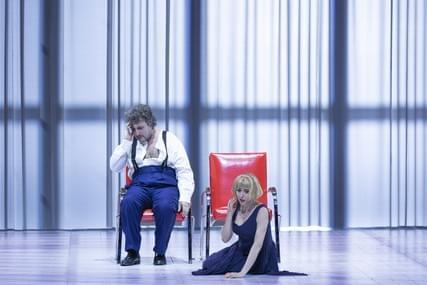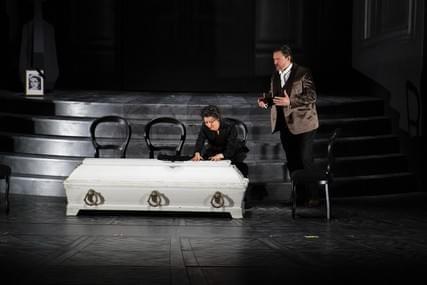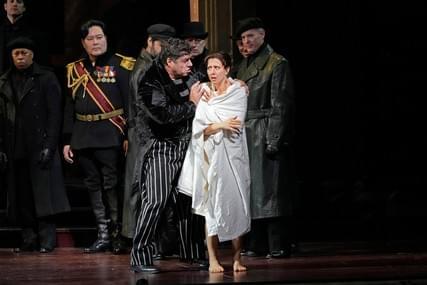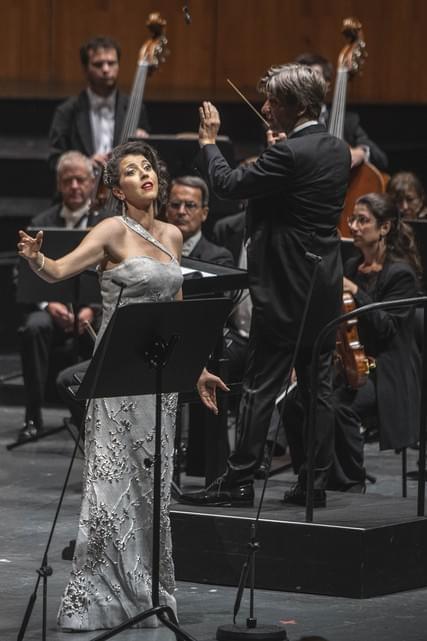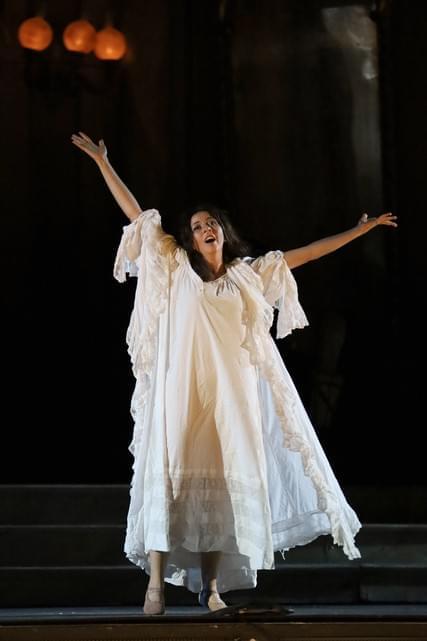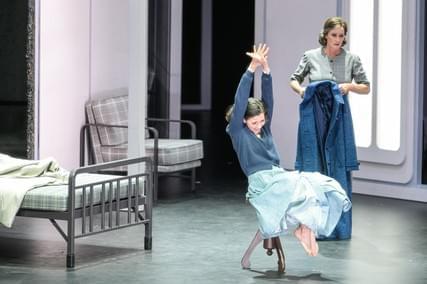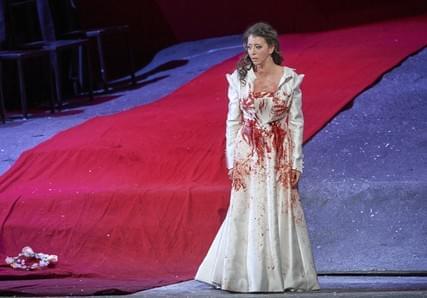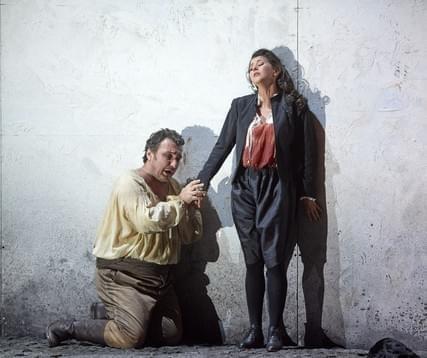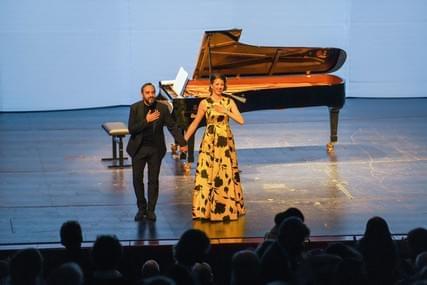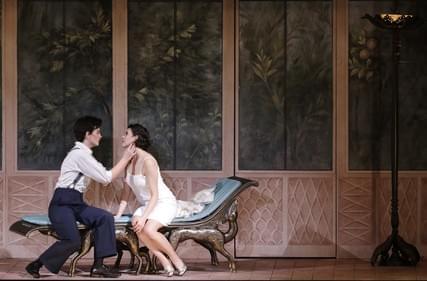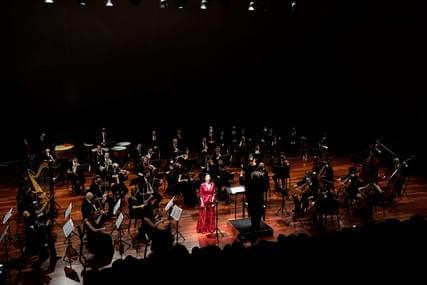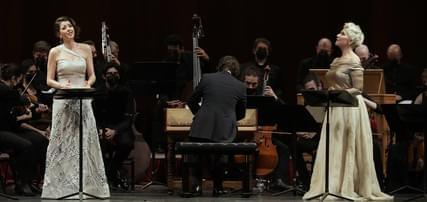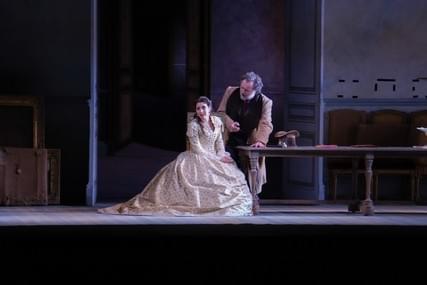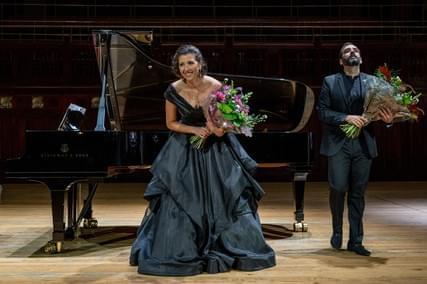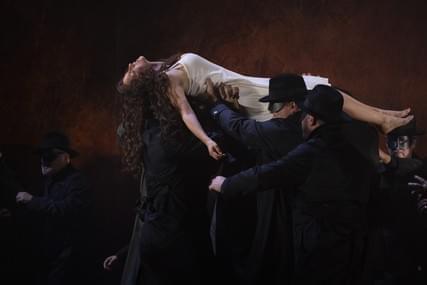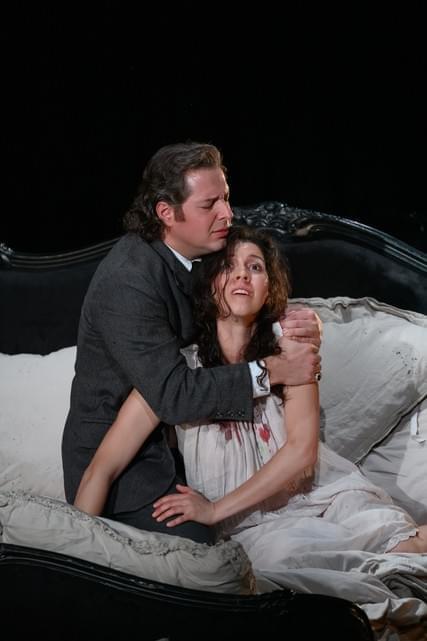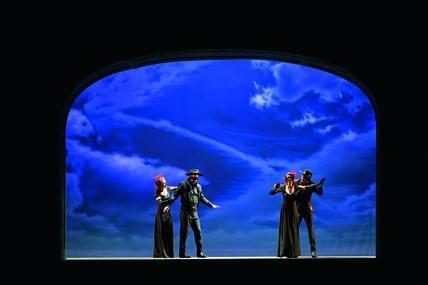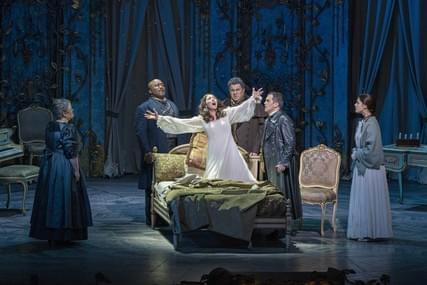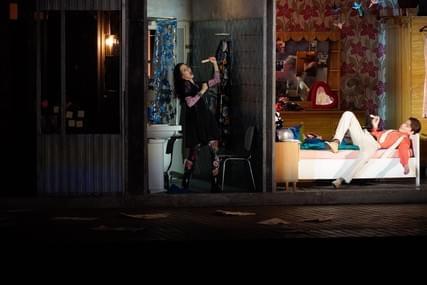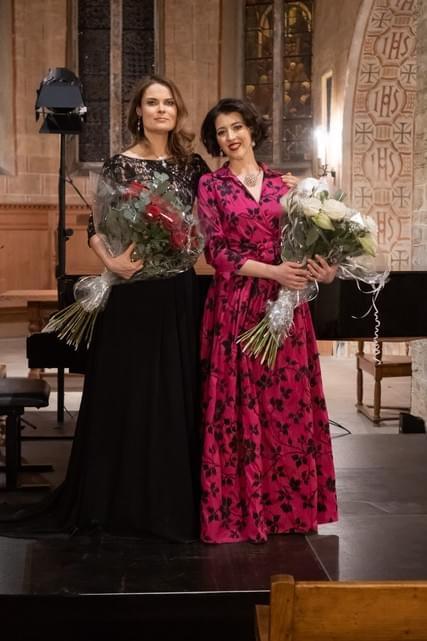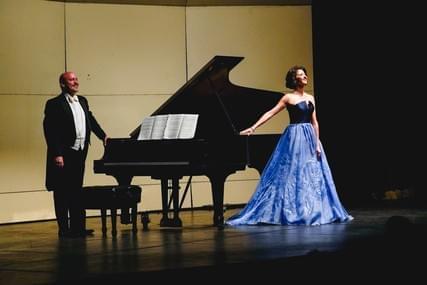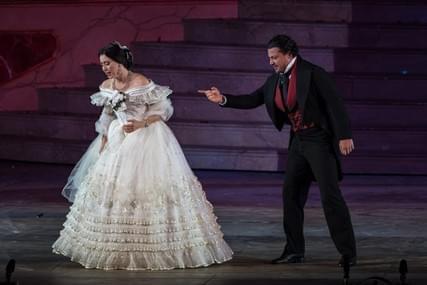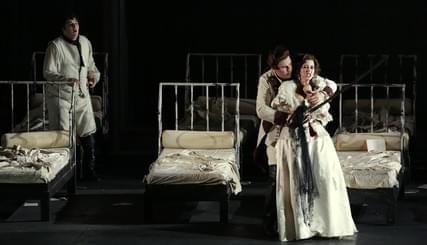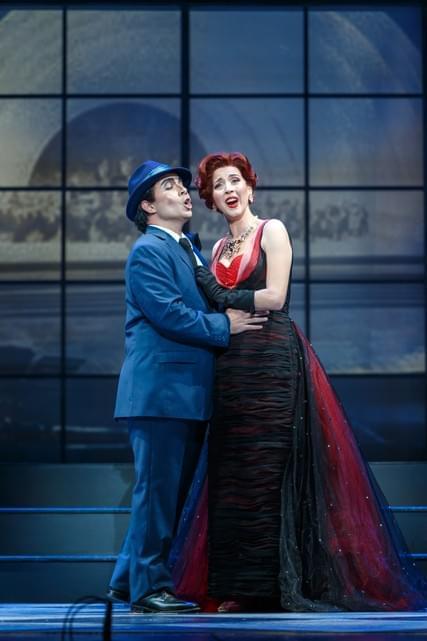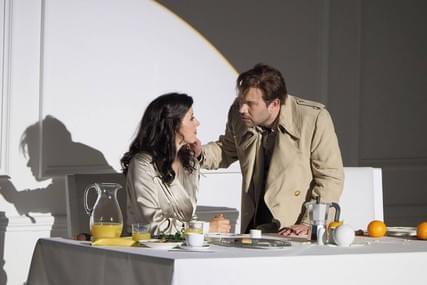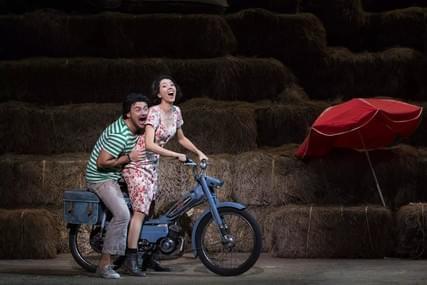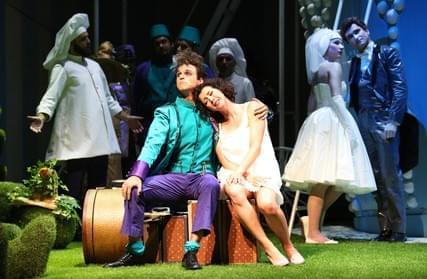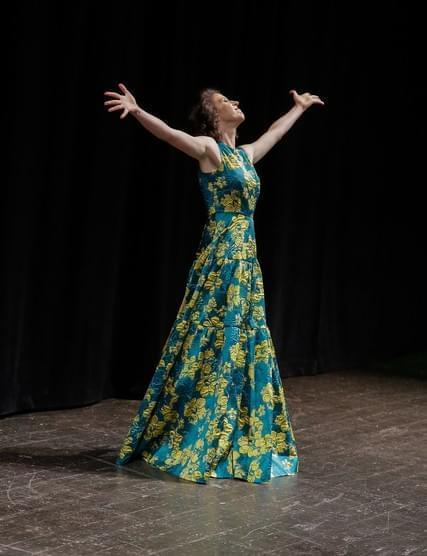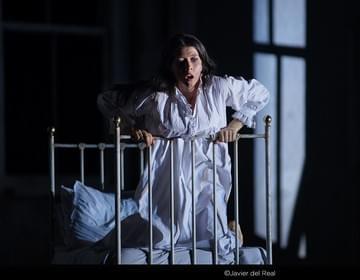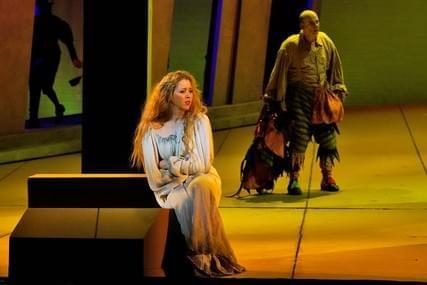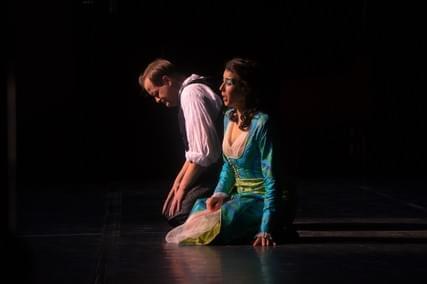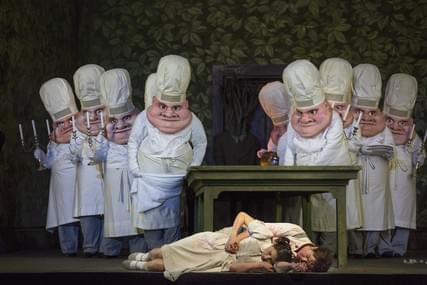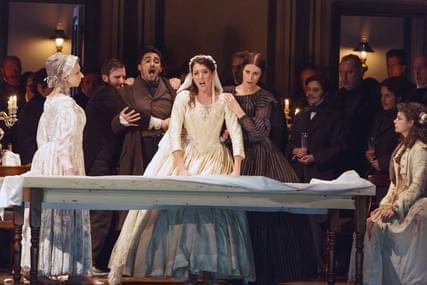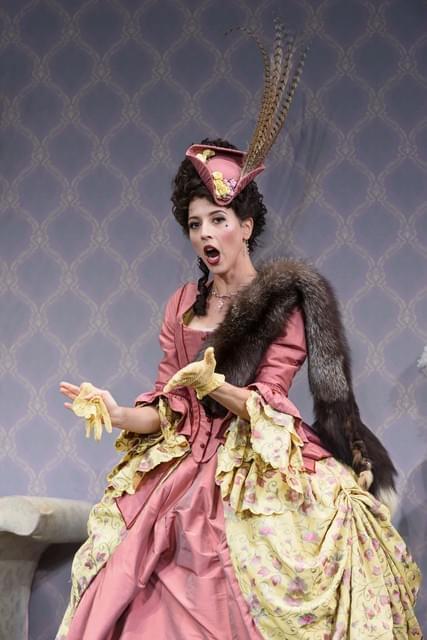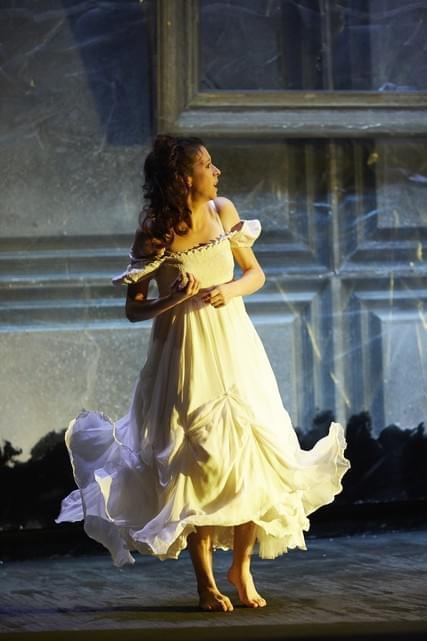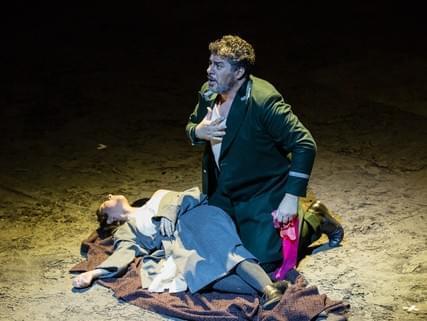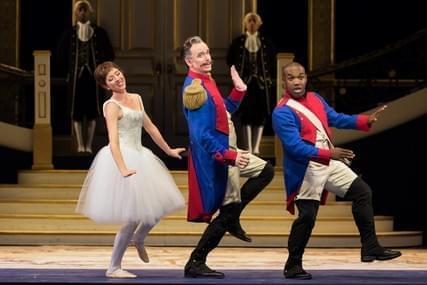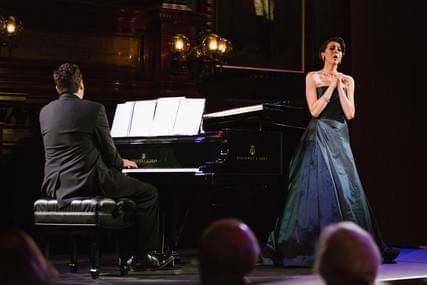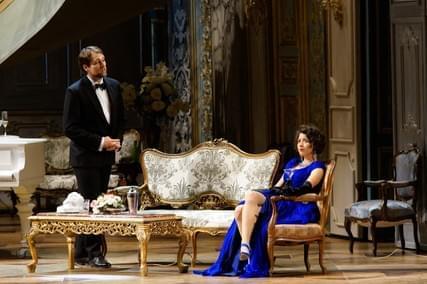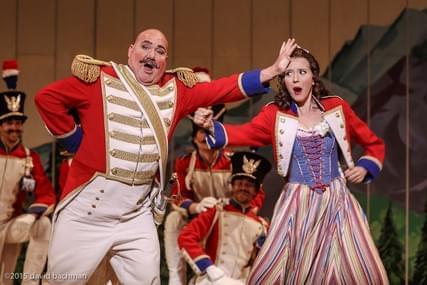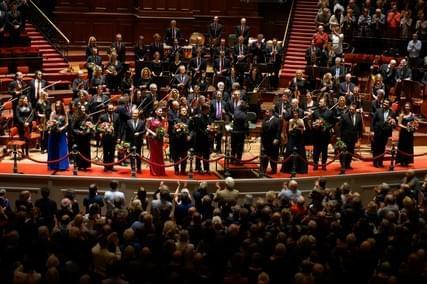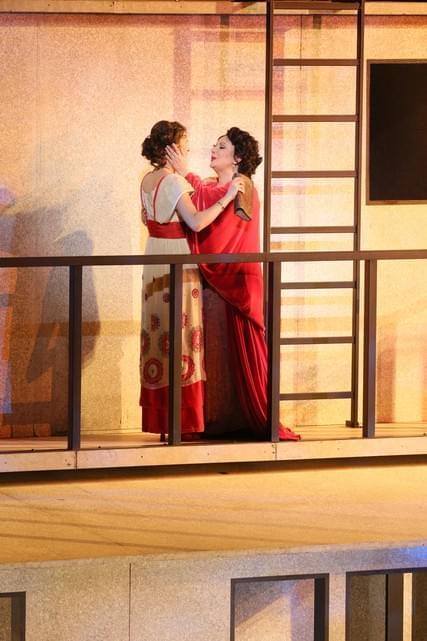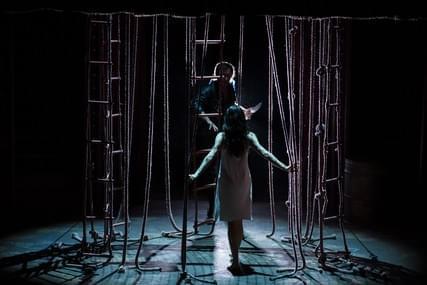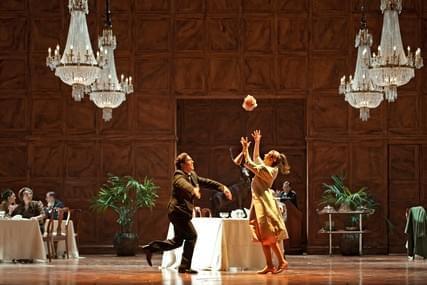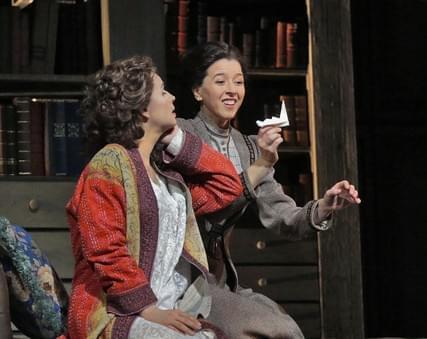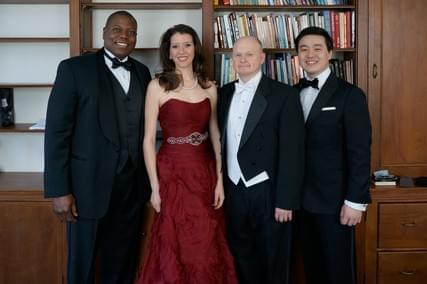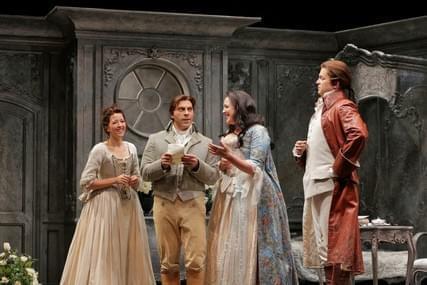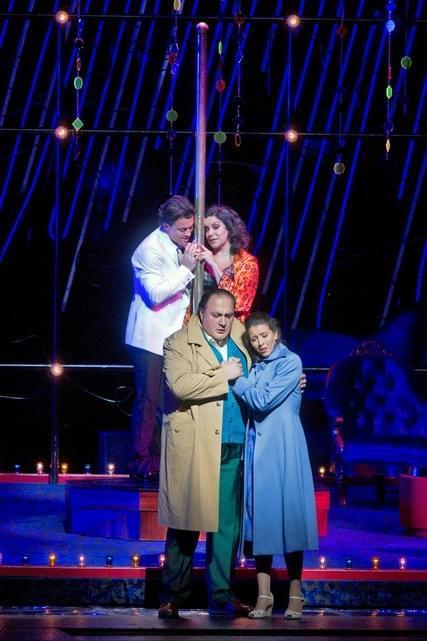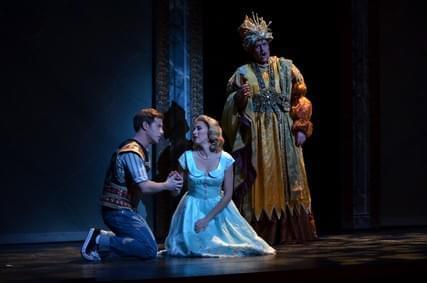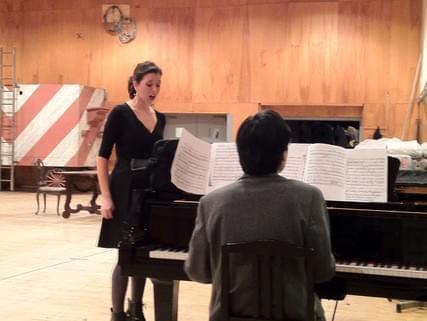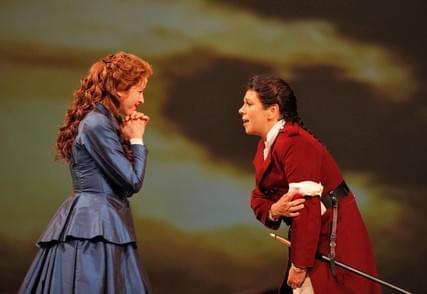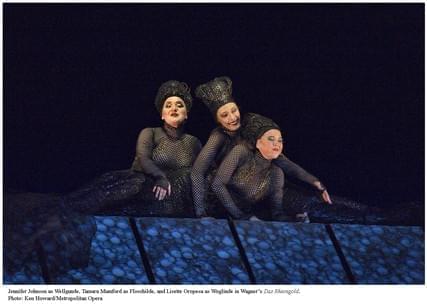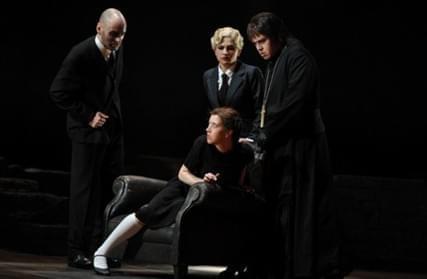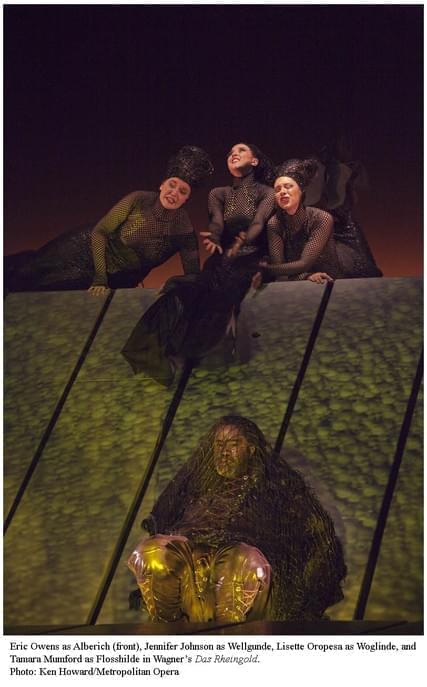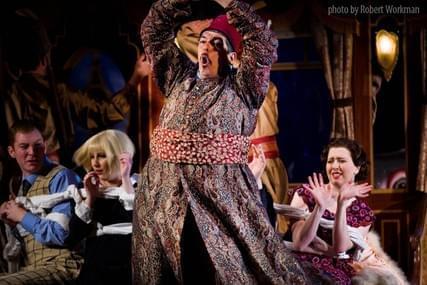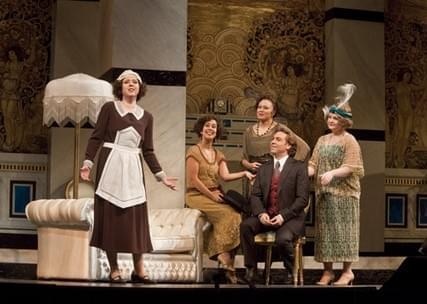Career
2025
Gilda
An extraordinary night of music and drama: Quinn Kelsey in LA Opera’s Rigoletto
Oropesa navigated the transition from innocence to maturity both in her stage presence and voice, moving from lyric coloratura to dramatic soprano which distinguishes her altered state.— Jane Rosenberg • Seen and Heard InternationalAlcina
Alcina, Furieuse magicienne à Versailles
L'américano-cubaine Lisette Oropesa, est magnétique dans le rôle principal d'Alcina, sœur de Morgana. La grande voix de la soprano léger, parée d'une robe bleu azur scintillante, donne toute sa complexité au rôle de la magicienne maudite. Toutes ses interventions sont riches d'un jeu d'actrice subtil et mesuré, engagé jusque dans sa posture. Sa voix puissante au reconnaissable vibrato rapide reçoit des acclamations. Elle convainc en amoureuse souriante, tout comme en magicienne, reine, femme, dévastée et plaintive, sa technicité lui permettant de mettre un effet « éraillé » sur sa voix. Des intervalles vertigineux au souffle dramatique, les frissons gagnent la salle à maintes reprises : la voix, solidement ancrée dans la poitrine, s'élève sans effort apparent et c'est ainsi qu'elle enchaîne les vocalises avec une virtuosité ensorcelante.The Cuban-American soprano Lisette Oropesa is magnetic in the main role of Alcina, sister of Morgana. The great light soprano voice, adorned in a sparkling azure blue dress, brings all the complexity to the role of the cursed sorceress. All her interventions are rich in subtle and measured acting, engaged even in her posture. Her powerful voice with a recognizable fast vibrato receives acclaim. She convinces as a smiling lover, as well as a sorceress, queen, woman, devastated and plaintive, her technique allowing her to put a "gritty" effect on her voice. From dizzying intervals to dramatic breaths, shivers sweep through the audience repeatedly: the voice, firmly rooted in the chest, effortlessly soars, enchanting with its virtuosic vocal acrobatics.— Olga Szymczyk • OlyrixElvira
Les Puritains à l’Opéra de Paris, après le disque, la version live !
Aux applaudissements, c’est Lisette Oropesa qui emporte tous les suffrages : dès les premières phrases (si difficiles), elle impose une voix brillante et colorée, au medium charnu, capable de vocaliser avec précision et de pousser jusqu’à des suraigus puissants (elle ose même la variation assassine sur “Vieni al tempio!”).Amidst the applause, it's Lisette Oropesa who receives all the votes: from the very first phrases (so difficult), she impresses with a bright and colorful voice, with a rich middle range, capable of vocalizing with precision and reaching powerful high notes (she even dares a killer variation on "Vieni al tempio!").— CJM • OlyrixSoprano
Gala anniversaire. 150 ans du Palais Garnier, 24 janvier 2025
Lisette Oropesa Mathilde souveraine, affichant un sens du phrasé unique, une élocution parfaite, un legato glorieux, bref une maîtrise sans faille du style rossinien.Lisette Oropesa, a sovereign Mathilde, displays a unique sense of phrasing, perfect elocution, glorious legato, in short, an impeccable mastery of the Rossini style.— Camillo Faverzani • Premiere Loge OperaSoprano
Staatsoper Hamburg: Ein kleines Lied sagte mehr als tausend Töne
„Im wunderschönen Monat Mai“, aus dem „Dichterliebe“-Zyklus. „Als alle Knospen sprangen/da ist in meinem Herz/die Liebe aufgegangen.“ Hier hing es um was, jenseits und vor allem: weit unterhalb der Koloraturen. Womöglich das Schwerste an diesem Abend für diese Sängerin, weil es so einfach zu klingen hat."In the beautiful month of May," from the "Dichterliebe" cycle. "When all the buds were bursting/ then in my heart/ love sprung up." Here staked something, beyond and above all: far beneath the coloraturas. Possibly the hardest thing on this evening for this singer, because it has to sound so simple.— Joachim Mischke • Hamburger AbendblattSoprano
Naples, Oropesa/Praticò concert, 01/09/2025
Si apprezzano nell’interpretazione di Lisette Oropesa la cavata e l’afflato lirico, l’abbandono alla elegante cantabilità delle melodie di Mercadante, l’irrobustimento del peso specifico della sua vocalità, che in queste pagine anticipa, in un recital dalla coerente e ben ponderata scelta dei brani, quella appropriata alle quattro successive romanze da camera di Giuseppe Verdi, È la vita un mar d’affanni, Stornello, Chi i bei dì m’adduce ancora, Perduta ho la pace. La lettura di queste quattro pagine è un microcosmo di stati d’animo, di fraseggio ricercato, un esempio di versatilità. Qui Lisette Oropesa riesce a trovare la “tinta” più appropriata per ciascuna romanza, la giusta accentazione, la migliore prosodia per ogni parola.One appreciates in Lisette Oropesa's interpretation the flourish and lyrical inspiration, the surrender to the elegant singability of Mercadante's melodies, the strengthening of the specific weight of her vocals, which in these pages anticipates, in a recital from the coherent and well-considered selection of pieces, that appropriate for the four subsequent chamber romances by Giuseppe Verdi, Life is a sea of troubles, Stornello, Who brings me the good days again, I lost my peace. The reading of these four pages is a microcosm of emotional states, of sought-after phrasing, an example of versatility. Here Lisette Oropesa manages to find the most suitable "shade" for each romance, the right accentuation, the best prosody for each word.— Luigi Raso • L'ape musicaleElvira
Erl, Tiroler Festspiele – I puritani (con Lisette Oropesa e Mattia Olivieri)
Sugli scudi, due degli interpreti principali. Lisette Oropesa, che canterà prossimamente il ruolo a Parigi, ha fatto sensazione con un canto che, senza insistere troppo su sopracuti, messe di voce e ornamentazioni aggiunte, mirava soprattutto a restituire un vero personaggio. In una prestazione di simile livello, le va riconosciuta una scena della pazzia del secondo atto memorabile anche per la gestualità, non condizionata per una volta dallo spartito sul leggio. Peccato che non si eseguisse il finale scritto per la Malibran, ma la polacca, i duetti con basso e tenore, e il suo “Ah vieni al tempio” (uno di quei momenti dove la musica di Bellini tocca il cielo e i cuori) verranno ricordati e giustamente.On the shields, two of the main performers. Lisette Oropesa, who will soon perform the role in Paris, made a sensation with her singing, which, without dwelling too much on high notes, messa di voce, and added ornamentations, aimed primarily at embodying a real character. In such a high-level performance, she deserves recognition for a scene of madness in the second act, memorable even for its gestures, not conditioned for once by the score on the music stand. It's a pity that the finale written for Malibran was not performed, but the polonaise, the duets with the bass and tenor, and her "Ah vieni al tempio" (one of those moments where Bellini's music touches the sky and hearts) will be remembered and rightfully so.— Jorge Binaghi • Conessi all'Opera
2024
Maria Stuarda
Nueva producción de 'Maria Stuarda' en el Teatro Real, con Lisette Oropesa, Aigul Akhmetshina e Isma
Frente a este torrente vocal, Lisette Oropesa, que debutaba en el papel, terminó por convertirse en una secundaria de lujo. Las cualidades que la han llevado a la fama brillaron también en su Maria Stuarda: el exquisito control de las dinámicas, el legato impecable que lució en la “Preghiera”, sus sobreagudos cómodos y un alegato final cargado de sensibilidad y encanto. Su interpretación enamora, y su canto conmueve profundamente.In the face of this vocal torrent, Lisette Oropesa, making her debut in the role, ultimately turned into a deluxe supporting actress. The qualities that have led her to stardom also shone in her Maria Stuarda: exquisite control of dynamics, impeccable legato that shone in the "Prayer", her comfortable overtones and a final plea full of sensitivity and charm. Her interpretation is captivating, and her singing deeply moves.— Juan José Freijo • Platea MagazineSoprano
Lisette Oropesa, virtuosismo vocal
Nos gustó mucho el melismático bolero de Delibes en el que exhibió todo tipo de escalas, picados y sostenidos gorgoritos y una inmaculada afinación. En la segunda mitad, como belcantista de depurada técnica, la jovial soprano atrajo la atención con el aria de la ópera L´Elisir D´Amore de Donizetti y sobre todo, en la difícil canzonetta «La Primavera» de Mercadante. Sin duda, Lisette Oropesa se movió a sus anchas en las piezas más ligeras, en las que su voz se adentraba con absoluta seguridad en los filados etéreos y en el dominio del registro agudo.We greatly enjoyed the melismatic bolero by Delibes in which he displayed all sorts of scales, staccato and sustained trills, and immaculate tuning. In the second half, the jovial soprano, with her refined bel canto technique, captivated attention with the aria from Donizetti's opera L'Elisir d'Amore and most notably, within the challenging canzonetta "La Primavera" by Mercadante. Undoubtedly, Lisette Oropesa comfortably excelled in the lighter pieces, in which her voice confidently ventured into ethereal sustains and the mastery of the high register.— Nino Dentici • El CorreoSoprano
Lisette Oropesa, de Genève à Cadix et Cuba
Un menu conséquent en somme, que la soprano vedette dévore avec un appétit qui semble plus que jamais venir en chantant. L’interprète confère à chaque mot tout son sens, à chaque émotion tout son poids, qu’il s’agisse d’évoquer l’amour, la peine, le rêve ou le regret. De cette Andalousie dont il est d’abord question, l’artiste restitue la chaleur et l’âme, dansante et enivrante, d’une voix aussi large que les jardins de l’Alcazar, avec un timbre aussi chaud et fleuri qu’une rue du vieux Cadix. Il y a aussi ce soleil, éclatant, qui émane d’aigus hardis mais tout en maîtrise, ici triomphaux, là presque susurrés, mais toujours d’une implacable tenue sonore. Le public s’en délecte, applaudissant après chaque mélodie cette artiste n’hésitant pas, à l’occasion, à esquisser quelques pas de danse chaloupés.A substantial menu, indeed, that the star soprano devours with an appetite that seems to grow even stronger as she sings. The performer brings to each word its full meaning, to each emotion its full weight, whether evoking love, sorrow, dreams, or regret. From Andalusia, the subject at hand, the artist captures the warmth and soul, danceable and intoxicating, with a voice as expansive as the gardens of the Alcazar, with a timbre as warm and blooming as a street in Old Cadiz. Then there’s the sun, brilliant, radiating from bold but perfectly controlled high notes, here triumphant, there almost whispered, but always with an implacable sonic presence. The audience revels in it, applauding after each melody this artist who, on occasion, does not hesitate to break into a few swaying dance steps.— Pierre Géraudie • OlyrixSoprano
A Rare Recital by a Rare Voice
The opening song, Rossini’s “L’invito” from Les soirées musicales, embodies a plea to a distant lover to come and join the singer, but here it functioned as a compelling invitation to an evening of vocalism by demonstrating the gorgeous state of Oropesa’s soprano. The lovely purity and resonance one remembers from performances here are coupled with greater fullness and depth of tone, which enhance her interpretations of the lyrical operatic repertoire and may one day lead to more dramatic fare. In any case, the flowing middle section of “L’invito” sounded especially luscious.None— George Loomis • Musical AmericaSoprano
Requiem de Mozart recueilli au Théâtre des Champs-Elysées
Enfin, Lisette Oropesa déclame avec un solide legato, une prononciation impeccable et une égalité dans les registres, de longues phrases incarnées et défendues avec une émotion palpable, notamment son entrée et sa partie conclusive où la salle frémit avec elle de l’intensité du moment et de la gravité d’un texte musical aussi impérissable.Lastly, Lisette Oropesa declares with a solid legato, impeccable pronunciation, and evenness in her registers, long embodied phrases defended with palpable emotion, notably her entrance and her concluding part where the room quivers with her during the intensity of the moment and the gravity of such an imperishable musical text.— Philippe Scagni • OlyrixManon Lescaut
Lisette Oropesa deslumbra con una Manon de referencia
Lisette Oropesa, y la soprano estadounidense no defraudó; pocas cantantes cuentan con una voz tan idónea para el papel como la suya. Posee las agilidades y sobreagudos que exige el personaje y que buena parte del público espera; pero Manon no es un papel para una soprano ligera, ya que necesita de una cantante con un centro carnoso para poder desplegar todos los colores que un rol tan amplio y complejo necesita; Oropesa no solo lo tiene, sino que lo sabe explotar. De esa forma logró plasmar cada situación dramática, utilizando para ello solo el canto y sin tener que recurrir a ningún efecto de tipo verista fuera de estilo. El mejor ejemplo fue el patetismo que consiguió en el último acto. A eso hay que unir en despliegue escénico insuperable, porque la soprano se entregó a la producción de Vincent Huguet encarnando el personaje en todas sus dimensiones.Lisette Oropesa did not disappoint, and the American soprano has a voice that is ideally suited for the role like few other singers. She possesses the agility and high notes that the character demands and that much of the audience expects; however, Manon is not a role for a light soprano, as it requires a singer with a meaty middle register in order to unfold all the colors that such a broad and complex role needs; Oropesa not only has this, but she knows how to exploit it. In this way, she managed to convey every dramatic situation using only her singing without having to resort to any verismo effects out of style. The best example was the pathos she achieved in the final act. To this must be added an unbeatable stage deployment, because the soprano fully committed to Vincent Huguet's production, embodying the character in all its dimensions.— César Rus • Opera ActualVioletta Valery
WIEN / Staatsoper: LA TRAVIATA mit Oropesa, Floréz & Dupuis
Allen voran die mitreißend singende wie auch darstellerisch berührende Lisette Oropesa in der Titelrolle. Die kubanisch-amerikanische Sopranistin bringt alles mit, was für diese Rolle essenziell ist: Eine wunderschöne Stimme, gerade groß genug, hell und fein timbriert, ausdrucksstark und technisch so versiert, dass sie mit eleganter Leichtigkeit anmutig und geradezu schwerelos durch die Kadenzen schweben kann. Sie ist zu zartestem Pianissimo fähig, aber auch in kraftvolle Sequenzen wie in „Sempre lbera“ sattelfest. Bewundernswert, wie sich Oropesa in den sich ändernden Gefühlswelten verwandeln kann, von verliebter Glückseligkeit im ersten Akt bis zur erschütternden Verzweiflung in „Addio del passato“ und dem letzten Aufflackern des Lebens- und Liebenswillen angesichts des Todes. Darstellerisch überzeugt sie mit ehrlicher, liebenswerter Aufrichtigkeit, nicht mit großen Gesten.Foremost among them is the captivatingly singing and emotionally engaging Lisette Oropesa in the title role. The Cuban-American soprano possesses everything essential for this role: a beautiful voice, just large enough, bright and finely timbred, expressive and technically skilled enough to gracefully and almost weightlessly float through the cadenzas with elegant ease. She is capable of the most delicate pianissimo, but also solid in powerful sequences like in "Sempre libera." Admirable is how Oropesa can transform herself in the changing emotional worlds, from the blissful joy of being in love in the first act to the heartbreaking despair in "Addio del passato" and the final flicker of life and will to love in the face of death. In her portrayal, she convinces with honest, lovable sincerity, not with grand gestures.— Manfred A. Schmid • Online MerkerOphélie
Konzertanter "Hamlet" in der Felsenreitschule: Der Dänenprinz auf Rachefeldzug
Die anspruchsvolle Rolle der Ophélie, die als Hamlets Braut unschuldig in dessen Rachepläne verwickelt wird und als "Verstoßene" im emotionalen Chaos Suizid begeht, liegt Lisette Oropesa gut. Von ihrer einsamen Wahnsinns-Szene mit Wechseln von Liebe zu Zweifeln und Verzweiflung, "À vos jeux, mes amis" als Höhepunkt der Oper konnte man nicht unberührt bleiben. Da hat man sich doch eine szenische Fassung herbeigewünscht, welche der hervorragenden Koloratursopranistin mehr Spielraum geboten hätte. Dennoch: das Publikum tobte.The demanding role of Ophelia, who, as Hamlet's bride, is innocently entangled in his plans for revenge and, as an "outcast," commits suicide in emotional chaos, suits Lisette Oropesa well. From her solitary madness scene with shifts from love to doubts and despair, "À vos jeux, mes amis" as the climax of the opera, one could not remain unaffected. There was indeed a desire for a scenic version that would have offered more space for the exceptional coloratura soprano. Nevertheless, the audience was ecstatic.— Ernst P. Strobl • Salzburger Nachrichten
Soprano
Zauber der Klassik: So war das Festival Cap Rocat auf Mallorca
Es war das Vorspiel zu dem Moment, als die Protagonistin des Abends, eine der gefragtesten Sopranistinnen der Welt, die Bühne betrat und bewies, warum ihr Terminkalender so voll ist. Lisette Oropesa verblüffte das Publikum mit einem abwechslungsreichen Repertoire, in dem Meisterwerke von Größen wie Donizetti, Verdi, Bellini und Rossini zu hören waren. Ihre Stimme vereinte die Weichheit von Samt und die angenehme Frische einer Sommerbrise.It was the prelude to the moment when the evening's protagonist, one of the most sought-after sopranos in the world, entered the stage and proved why her schedule is so packed. Lisette Oropesa amazed the audience with a versatile repertoire, featuring masterpieces from luminaries such as Donizetti, Verdi, Bellini, and Rossini. Her voice combined the softness of velvet and the pleasant freshness of a summer breeze.— Mallorca Magazin • Mallorca MagazinSoprano
A singing orchestra that presents a feast of sound
The second songs were two Mozart concert arias by American soprano Lisette Oropesa. It was a superb performance combining Oropesa's flawless technique, rich tone, and wonderful accompaniment worthy of an opera orchestra. I thought it would have been great if yesterday's program consisted of only Mozart opera overtures and arias.None— Gwangyeol Jeon • MBN (MSN.com)Soprano
Night of the Queen of the Night
In her early Mozart aria A Berenice, Ms. Oropesa changed colors, played with the words, ripped up and down the scale like a marathon sprinter, and offered a rainbow-colored gift to us all.(By the way the story that A Berenice was the 13‑year‑old Mozart’s thank‑you letter to Aunt Berenice for a bar mitzvah gift is almost certainly fallacious.)This was Queen of the Night stuff incarnate. Coloratura, yes, with scales darting past a high D. Yet also tender, with a sensuous legato. Trills worthy of any Classical diva, precise leaps over the octaves. But above all, a care for the words, a change of sounds, a miraculous merger of vocalism and verbal understanding.None— Harry Rolnick • Concerto NetSoprano
Antonio Pappano Celebration — the Royal Opera maestro’s regal sendoff
The soprano Lisette Oropesa showed brilliant vocal acting in her Don Pasquale nugget and later soared assuredly over the trio from Der Rosenkavalier. the ecstatic conclusion to Rossini’s William Tell, with Finley as the Swiss freedom fighter, Oropesa’s soprano glinting again and the chorus movingly imploring: “Reign over us once more!”None— Neil Fisher • The TimesSoprano
Pour ses 177 ans, le Liceu fait briller quatre étoiles
En deuxième partie, Oropesa nous offrira une valse de Juliette miroitante à souhait : sa voix possède ce brillant orné de velours qui laisse jaillir une artiste élégante et noble. Ensuite Camarena attaquera « Ah, lève-toi, soleil » du même ouvrage. Magistral aussi, car l’éclat de son instrument est mis au service d’un interprète engagé, intelligent et sensible.In the second part, Oropesa will offer us a shimmering waltz from Juliette as desired: her voice possesses that brilliant, velvet ornamentation that reveals an elegant and noble artist. Next, Camarena will tackle "Ah, rise, sun" from the same work. Also masterful, as the brightness of his instrument is at the service of a committed, intelligent, and sensitive performer.— Xavier Rivera • Crescendo MagazineSoprano
Oropesa e Bernheim alla Scala: quando la classe è doppia
Singolarmente la Oropesa ha giocato le sue carte migliori nell’aria dai Masnadieri (opera con cui aveva fatto il suo fortunato debutto nella sala del Piermarini), come nell’aria dei gioielli del Faust, in cui ha fatto valere tutta la sua souplesse virtuosistica come i trilli granitissimi, per guadagnarsi poi il massimo successo nella struggente “Robert, toi que j’aime” dal Robert le Diable di Meyerbeer, magistralmente risolta con una levigatezza d’emissione, una fantasia nelle mezzevoci e nei pianissimi, una cadenza spettacolare per arditezza strumentale e precisione davvero superlative.Singularly, Oropesa played her best cards in the aria from I Masnadieri (an opera with which she had made her successful debut at the Piermarini theater), as well as in the Jewel Song from Faust, where she showcased her virtuosic suppleness like her incredibly solid trills, earning her the highest success in the poignant "Robert, toi que j’aime" from Meyerbeer's Robert le Diable. She masterfully delivered this with a smoothness of voice, a creative use of half voice and whispers, and a spectacular cadenza known for its daring instrumental boldness and truly superior precision.— Davide Annachini • DelTeatroSoprano
Récital de Lisette Oropesa et Benjamin Bernheim, tout s’accorde au TCE
Lisette Oropesa démontre sa maîtrise, avec subtilité, du répertoire italien, notamment dans la virtuosité et l'ornementation, parée en sus de trilles enivrants. Le répertoire français (Marguerite, Isabelle) reprend et épanouit ces couleurs, dans une gradation des sentiments et des demi-teintes rayonnantes de transparence.Lisette Oropesa demonstrates her mastery, with subtlety, of the Italian repertoire, especially in virtuosity and ornamentation, further adorned with intoxicating trills. The French repertoire (Marguerite, Isabelle) takes up and blooms with these colors, in a gradation of emotions and half-tones that radiate with transparency.— José Pons • OlyrixAmina
Incanta la Sonnambula di Lisette Oropesa,
Lisette Oropesa, al debutto nel ruolo di Amina dopo essere stata protagonista con il lirico capitolino dell'opera-film La traviata per la regia di Mario Martone, ha dato sfoggio delle sue straordinarie capacità belcantistiche strappando applausi e 'brava' nei duetti come da sola nelle melodie più struggenti.Lisette Oropesa, making her debut in the role of Amina, after being the protagonist with the lyric Capitolino in the opera-film La traviata directed by Mario Martone, showcased her extraordinary bel canto abilities, garnering applause and 'bravos' in duets as well as in the most poignant melodies on her own.— ANSA • Ansa.itMathilde
„Willhelm Tell“: Peinliches und Gelungenes in Spitzenbesetzung
Oropesa ist auch die stärkste Stimme des Abends. Sie bringt Poesie und Farbe in die schwere Partie, meistert nicht nur die Höhen und Koloraturen bravourös, ihr gelingt ein echtes Porträt.Oropesa is also the strongest voice of the evening. She brings poetry and color to the challenging role, not only mastering the high notes and coloraturas effortlessly, but also succeeds in creating a genuine portrait.— Martin Gasser • Kleine Zeitung SteiermarkVioletta Valery
La Traviata à Bastille, ou la "grâce" des réseaux sociaux
Mais Violetta Valéry, en ce dimanche après-midi, n'est nulle autre que Lisette Oropesa, triomphale de puissance mélodieuse tout en incarnant parfaitement la séductrice assumée. Son jeu et sa voix dynamique élargissent l'espace scénique et acoustique, sachant percer le mur d'orchestre et des c(h)œurs par ses accents, sans négliger les grands moments de douceurs et la claire déclamation du texte.But Violetta Valéry, on this Sunday afternoon, is none other than Lisette Oropesa, triumphant in her melodious power while perfectly embodying the confident seductress. Her performance and dynamic voice broaden the stage and acoustic space, skillfully piercing the wall of orchestra and choirs with her accents, without neglecting the great moments of tenderness and the clear declamation of the text.— Juan Barrios • OlyrixCleopatra
Night at the Museum
It’s hard to imagine a more appropriate choice for the role of Cleopatra than the incandescent Lisette Oropesa. A coquette par excellence, she has the vocal and dramatic prowess to embody Ptolemaic Egypt’s last queen. Her glorious lyric coloratura had just the right timbre, feminine and fruity. Vocally, she excelled in all her arias, but her Act II aria “V’adoro pupille” was the most sensual. Technically, her Act III aria “Da tempeste il legno infranto” was the most dazzling.None— Ossama el Naggar • Concerto NetSoprano
Deux grandes voix en fusion lyrique à Rougemont
Toute la gamme des émotions y est: la révolte, l’affliction, les coups de colère, la résignation, la tendresse. Lisette Oropesa n’est pas qu’une jolie voix de soprano colorature au timbre cristallin. Son chant s’enflamme; la voix est surprenamment longue, couronnée d’aigus percutants, quoique aucunement criards, descendant parfois dans le grave sans effet de rupture dans les registres. Un éclat radieux en émane.The entire range of emotions is present: rebellion, affliction, flashes of anger, resignation, tenderness. Lisette Oropesa is more than just a pretty coloratura soprano voice with a crystalline timbre. Her singing catches fire; the voice is surprisingly long, crowned with striking high notes, though in no way screechy, sometimes descending into the low range without any break in the registers. A radiant brilliance emanates from it.— Julian Sykes • Le Temps
2023
Marie
Lyric Opera’s ‘Daughter of the Regiment’ a romp rich with laughs and some of Donizetti’s best music
The ultimate star of the show, though, is Oropesa, an American soprano who is making her Lyric debut. An innate physical comedian with a comfortable, compelling stage presence, she is a complete natural as Marie. Oropesa has a supple, agile soprano voice, with a winningly honest and direct style. Seemingly unfazed by the vocal or physical demands of this role, this indefatigable singer handles its legendary coloratura with eye-opening ease and aplomb. Expect to see Oropesa back as soon as Lyric can re-sign her.None— Kyle MacMillan • Chicago Sun TimesVioletta Valery
Eine umjubelte "La Traviata" an der Staatsoper
In der kühl-kuriosen Instagram-Inszenierung von Simon Stone siedelte Oropesa die Violetta Valéry stimmlich auf der kräftigen Seite an, selbst im Angesicht des nahenden Bühnentods. Wie zielsichere Pfeile die Spitzentöne der US-Amerikanerin, routiniert ihre Koloraturakrobatik.In the coolly curious Instagram staging by Simon Stone, Oropesa vocally positioned the Violetta Valéry on the robust side, even in the face of impending stage death. The top tones of the American were as unerringly targeted as arrows, her coloratura acrobatics practiced.— Stefan Ender • Der StandardVioletta Valery
[Report] Rome Opera House 2023 Japan performance “La Traviata” first day report
On the opening day of La Traviata at the Roman Opera House, Lisette Oropesa, who played the heroine, showed the Japanese audience that she is the goddess of opera and the ultimate Violetta. She has a pretty appearance and looks great in Valentino's costumes, and even in the long aria of the first act, she did not lose her composure, and she did not hesitate to use her ultra-high notes to resonate bravely. Her emotional expression is rich, but the reason it never becomes tedious is probably because there is a mysterious mystique in her voice. There are singers who play this role in a verismo style and end up with a dull voice, but Oropesa's emotional expression is musical and elegant, and the high level that she aims for in her opera. No matter how much you listen to her, she has a voice that makes you want to hear more, and some of her sounds reminded me of golden-era Maria Callas recordings (even though her physique was completely different!) ). There is a faint classical elegance to it, and above all, the tragic nature of the story is conveyed in a very true manner.None— Hisae Odajima • NBSSoprano
ÁGUILAS / Lisette Oropesa y la maldición de la Princesa de Bouillon
Para entonces y ya desde el bolero “¡Ay pobre Curro mío!” de Gounod con el que se abrió el recital, Oropesa se había metido en el bolsillo al respetable gracias a la capacidad comunicativa de su voz y de su manera de frasear. La voz es de un timbre seductor, con matices levemente oscuros en origen que adquieren brillo mediante una técnica de colocación y de proyección intachables, de manera que cuando sale, la voz tiene un temblor de emoción y una gama de colores que la hacen inconfundible. Con el sonido perfectamente cubierto en toda la gama, las transiciones entre registros prácticamente no existen, el sonido fluye con una naturalidad desarmante sin saltos ni cambios, plenamente audible en todo el espectro dinámico. Con tales herramientas técnicas a su servicio, Oropesa puede abordar con seguridad el terreno expresivo del fraseo que la ha encumbrado al podio mundial de la ópera.By then, and even from the bolero "¡Ay poor Curro mio!" by Gounod, which opened the recital, Oropesa had won over the audience due to the communicative power of her voice and her way of phrasing. The voice is of a seductive timbre, with slightly dark nuances in origin that gain brightness through unblemished placement and projection techniques so that when it emerges, the voice has a tremor of emotion and a range of colours that make it unmistakable. With the sound perfectly covered across the range, transitions between registers are practically non-existent, the sound flows with disarming naturalness without jumps or changes, and is fully audible in the entire dynamic spectrum. With such technical tools at her service, Oropesa can confidently tackle the expressive terrain of phrasing that has elevated her to the global opera podium.— Andrés Moreno Mengíbar • Scherzo MagazineVioletta Valery
Sempre libera... e bella
La seconda recita della Traviata areniana ha presentato un ottimo cast capitanato dal soprano americano Lisette Oropesa che aveva già fatto il suo debutto trionfale nell’opera verdiana riscuotendo un successo folgorante: non c’era alcun dubbio che lo avrebbe confermato. Sarebbe banale se non noioso descrivere le sue doti di cantante e attrice; Oropesa è nata per interpretare il mitico ruolo e “condannata” a portare il pubblico ad un felice delirio: e così è stato ieri sera. Il fisico perfetto per Violetta, la naturalezza disarmante d’attrice, la voce dal vibrato caratteristico ma ben timbrata e dotata di una lucentezza particolare, la tecnica impeccabile hanno riscosso un grande successo; numerose chiamate a scena aperta e espressioni infinite d’ammirazione per lo stupefacente soprano statunitense.The second performance of "La Traviata" at the Arena showcased an excellent cast led by the American soprano Lisette Oropesa, who had already made her triumphant debut in the Verdi opera, achieving dazzling success: there was no doubt she would confirm that. It would be trivial, if not tedious, to describe her singing and acting skills; Oropesa is born for the legendary role and "condemned" to bring the audience to euphoric rapture: and so it was last night. Her perfect physique for Violetta, disarmingly natural acting, a voice with distinctive vibrato yet well-timbred and with a particular shine, impeccable technique all garnered great success; numerous curtain calls and endless expressions of admiration for the astonishing American soprano.— Irina Sorokina • L'ape musicaleLucie
Aix-en-Provence - Grand Théâtre de Provence: Lucie de Lammermoor
Lisette Oropesa appare più a suo agio rispetto alla recente produzione scaligera in versione italiana. Chailly le chiedeva un’intensità drammatica che forse non è la sua tazza di tè; e il soprano rispondeva da grande artista mettendo a disposizione tutte le sue risorse di tecnica e temperamento. Però in altre occasioni avevo sentito la voce più libera e il canto più alato. Con Daniele Rustioni Lisette Oropesa torna ad essere la vocalista che ricordavo senza nulla perdere quanto a intensità espressiva. Si potrebbe pensare che Lucie la favorisca rispetto alla consorella, ma non è così avendola ascoltata anche in altre produzioni della versione italiana. Certo in “Que n’avons-nous des ailes” ha modo di sfoggiare tutta la grazia, l’eleganza che le sono proprie, con una vocalizzazione nitida, trilli perfetti; per non parlare delle messe di voce, del legato, dei picchettati, degli acuti e sopracuti in pianissimo o sul forte; insomma tutto l’armamentario della grande virtuosa è ben presente. L’aria e la cabaletta della pazzia sono nella tonalità originale, quindi un tono sopra rispetto alle esecuzioni correnti, connotazione che restituisce al personaggio un'ulteriore siderale lontananza, perso in una dimensione già ultraterrena. Niente sopracuti conclusivi e cadenza alla fine della prima parte molto elaborata e d’effetto. Ma se la vocalista entusiasma l’interprete non è da meno e dà vita a una Lucie fragile ma non esangue, liricissima, dolce, però capace di momenti di rivolta, unica donna in questa versione a fronte di un universo maschile dominatore e soverchiante. Insomma una prova maiuscola a cui il pubblico risponde con vere e proprie ovazioni.Lisette Oropesa appears more comfortable compared to the recent Scala production in the Italian version. Chailly was asking her for a dramatic intensity that perhaps is not her cup of tea; and the soprano responded as a great artist by bringing all her technical and temperamental resources to the disposal. However, on other occasions I had heard her voice freer and her singing more winged. With Daniele Rustioni, Lisette Oropesa returns to being the vocalist I remembered without losing any expressive intensity. One might think that Lucie favors her over her sister, but it's not so, as I've also heard her in other productions of the Italian version. Sure enough in "Que n’avons-nous des ailes" she gets to show off all the grace and elegance that are hers, with clear vocalization, perfect trills; not to mention the voice mass, the legato, the staccato, the high and extreme high notes in pianissimo or on the forte; in other words, all the weaponry of the great virtuoso is well present. The aria and the insanity cabaletta are in the original key, therefore a tone above compared to current performances, a connotation that gives the character an additional astral distance, lost in an already otherworldly dimension. No final high notes and a very elaborate and effective cadenza at the end of the first part. But if the vocalist thrills, the interpreter is no less and gives life to a fragile but not bloodless Lucie, very lyrical, sweet, but capable of moments of rebellion, the only woman in this version to face a male-dominated and overwhelming universe. In short, a major test to which the audience responds with genuine ovations.— Silvano Capecchi • Opera ClickJuliette
Soprano Lisette Oropesa and tenor Amitai Pati shine as the lovers of Savonlinna's Romeo and Juliet
The biggest star of the production is the soprano Lisette Oropesa , whose interpretation of the young Julia is not only amazing vocal art, but also fresh stage work, which depicts a young person in love first brightly, then in darker tones when things in love start to go seriously wrong.None— Samuli Tiikkaja HS • Helsingin SanomatSoprano
Lisette Oropesa toi hurmaavan tunnelatauksen Espanjasta
This deep dive to songs influenced by Spain fits very well to the image of Lisette Oropesa’s artistry. Spanish is her native language and French is her preferred singing language. The quickly changing, dramatic, moods of the music also fit to Oropesa’s quickly reacting personality and expression. Her voice transforms from dark, colorful low register to very high notes. A lot can happen during one long voice. Oropesa plays with the shades of the music, she stretches time and highlights the text so that it touches your soul. Dark emotions, pure joy and playfulness, heart-wrenching pain, and longing – Oropesa’s singing gave room for all of the emotions and they came across easily, naturally and masterfully. Everything seems to be easy and natural for this soprano.None— Riitta-Leena Lempinen-Vesa • Itä-SavoSoprano
The Met Chorus shines radiantly in music of loss at Carnegie Hall
Oropesa’s “Ihr habt nun Traurigkeit.” ... she sang with a touch of rubato, her lines opening up and gliding above the orchestra. There was a feeling of joy in her singing.Oropesa's "Ihr habt nun Traurigkeit"... she sang with a touch of rubato, her lines expanding and soaring above the orchestra. There was a sense of joy in her performance.— George Grella • New York Classical ReviewFiorilla
Lisette Oropesa protagoniza "Il turco in Italia" de Rossini en el Teatro Real
la apoteósica - no sabría definirla de otra manera - Fiorilla de Lisette Oropesa, quien hizo y deshizo en lo vocal. No brilló tanto en la página de salida Non si dà follia maggiore, quiza a merced de la edición crítica por encima de tradiciones interpretativas... pero, su voz se desplegó en frescura, luminosidad y con ese carácter efervescente del personaje en el dúo con su marido Per piacere alla signora, así como en el terceto - que deriva en dúo - del segundo acto, Scusate... Trovarvi sola... Credete allefemmine. Y, por su puesto, en su aria final, donde volvió a poner en juego variaciones medidas, sutiles, agudo descollante, no tanto el de cierre, con un timbre centelleante, de bello vibrato y derrochando comedia, salpicada del justo patetismo para intentar entender el por qué de su arrepentimiento.The apotheotic - I wouldn't know how to define it any other way - Fiorilla by Lisette Oropesa, who vocally did everything right and wrong. She did not shine as much in the opening piece Non si dà follia maggiore, perhaps at the mercy of a critical edition over interpretive traditions... but her voice unfolded with freshness, brightness, and with that effervescent character of the role in the duet with her husband Per piacere alla signora, as well as in the tercet - which turns into duet - of the second act, Scusate... Trovarvi sola... Credete allefemmine. And, of course, in her final aria, where she again played with measured variations, subtle, outstanding high notes, not so much the closing ones, with a sparkling timbre, beautiful vibrato and overflowing with comedy, sprinkled with just the right pathos to try to understand the reason for her regret.— Gonzalo Lahoz • Platea MagazineLucia
Una Lucia gotica alla Scala
Dalla sua ha Lisette Oropesa, interprete ideale di Lucia, per vocalità duttile e partecipazione attoriale sorvegliatissima. Ora sognante, ora dolente, ora smarrita fino alla scena madre finale con l'abito da sposa lordo di sangue.From her we have Lisette Oropesa, the ideal interpreter of Lucia, for her flexible vocal range and extremely monitored acting participation. Now dreamy, now sorrowful, now lost, up to the final mother scene with the wedding dress stained with blood.— Stefano Jacini • Giornale della MusicaOphélie
THOMAS, Hamlet – Paris (OnP)
A ses côtés, Lisette Oropesa campe une Ophélie tout en délicatesse avec une voix plus large que celles que l’on entend habituellement dans ce rôle, ce qui lui permet de remplir sans problème le grand espace de la Bastille. Le medium est corsé, l’aigu solide et bien projeté, la colorature irréprochable et la diction parfaitement intelligible. Sa scène de la folie, complète avec les reprises, lui a valu une ovation largement méritée.At her side, Lisette Oropesa plays an Ophelia filled with delicacy, possessing a broader voice than those typically heard in this role, enabling her to easily fill the large space of La Bastille. The medium range is robust, the high notes solid and well-projected, the coloratura flawless, and the diction perfectly intelligible. Her mad scene, complete with reprises, earned her a thoroughly deserved ovation.— Christian Peter • Forum OperaSoprano
Mozart füllt Säle und die Riesenbühne
Lisette Oropesa bescherte etwas fülligere Belcanto-BrillanzLisette Oropesa provided a somewhat fuller bel canto brilliance.— Florian Oberhummer • Salzburger NachrichtenAmalia
"I Masnadieri" im Nationaltheater: Weiblich neu
Lisette Oropesa überraschend viele Wesenszüge von Verdis späteren Frauenrollen: Sie bindet in den Cavatinen und Cabalettas die Spitzentöne zwar makellos pianissimo in die Linie ein. Doch ihr Legato ist unter der zart lebendigen Oberfläche sehnig gestützt, die Melodien hält sie entschlossen fest und spannt sie in der Staatsoper zu enorm tragfähigen Bögen auf. Und Lisette Oropesas düstere Tiefe lässt an die Dramatik der Lady Macbeth denken, die wenige Monate vor den "Masnadieri" das Licht der Welt erblickt hatte.Lisette Oropesa surprisingly embodies many characteristics of Verdi's later female roles: She seamlessly incorporates the high notes, played perfectly pianissimo, into the line of the cavatinas and cabalettas. However, her legato is braided with flexile support underneath its gently vibrant surface, she firmly holds onto the melodies and structures them into enormously supportive arcs at the Staatsoper. And Lisette Oropesa's somber depth is reminiscent of the drama of Lady Macbeth, who had been brought into the world a few months before "Masnadieri".— Michael Bastian Weiß • Abendzeitung München
2022
Gilda
RIGOLETTO ~ A Matinee at The Met
And her vocalism was ravishing. Strong emotional currents run thru everything Lisette sings; she can find just the right colour for every note and word, and it all seems perfectly spontaneous. A magical, palpable hush settled over the House during Lisette's "Caro nome": an exquisite portrait of a young girl on the brink, the innocence of the words underscored by a subtle sense of longing. In the ensuing scenes, phrase after phrase of captivating tone and nuance - from her defiance in the vendetta duet to the heart-wrenching poignancy of her farewell to her father - showed again what a thoughtful and unique artist this soprano is.None— Oberon • Oberon's GroveAlcina
Alcina review – witty and vibrant staging full of beastly style
In a mostly international cast, Lisette Oropesa inhabited the title role with enormous style, her creamy tone absolutely suits the part.None— Martin Kettle • The GuardianElvira
FRETTOLOSA E MONOTONA LA DIREZIONE D'ORCHESTRA DI SAGRIPANTI. OROPESA LA PIU APPLAUDITA ANDUAGA TUTT
Applaudita più di tutti è Lisette Oropesa, al debutto nel ruolo di Elvira: 'agilità sfoderata nei passaggi di bravura è ragguardevole, lo scintillio della voce non sacrifica l'eleganza della frase; è su que. sto terreno esclusivo che il soprano americano costruisce la performance, lasciando a cimenti futuri la possibilità di caratterizzare a fondo un personaggio che pure, nei tre atti, cambia pelle più volte.The most applauded of all is Lisette Oropesa, debuting in the role of Elvira: the agility she displays in the bravura passages is remarkable, the sparkle of her voice does not sacrifice the elegance of the phrase; it's on this exclusive territory that the American soprano builds her performance, leaving to future endeavours the possibility to deeply characterize a character who, over the course of three acts, changes skin several times.— Stefano Valanzuolo • Il Mattino NapoliLucia
Jubel für letzte konzertante Oper bei Salzburger Festspielen
Lisette Oropesa rettete hier die Komposition selbst. In der berühmten "Wahnsinnsarie" im dritten Akt hat Donizetti der Sopranistin nämlich meist nur eine Flöte (in seltenen Fällen wie hier bei den Festspielen eine Glasorgel) als Spielpartnerin an die Seite geschrieben. So konnte Oropesa ihre Flexibilität, ihre glasklaren Passagen und ihre kraftvolle Schönheit weitgehend unbeschwert ausstellen. Sie machte klar, warum die Lucia aktuell zur ihren Paraderollen gehört. Ihre privaten Erfahrungen als Marathonläuferin brachten ihr vermutlich das Durchhaltevermögen für die großen Ensemblepassagen, in denen ihr dann teilweise die Kraft auszugehen drohte.Lisette Oropesa truly saved the composition itself here. In the famous "Mad Scene" in the third act, Donizetti indeed usually provides the soprano with only a flute (and in rare instances, like here at the festival, a glass harmonica) as a partner in the duet. This allowed Oropesa to display her flexibility, her crystal-clear passages, and her powerful beauty with little to no hindrance. She made it clear why Lucia is currently one of her signature roles. Her personal experiences as a marathon runner likely gave her the stamina for the demanding ensemble sections, in which she seemed to be on the verge of running out of energy at times.— News.at • News.ATSoprano
Arena bagnata e fortunata
All’altezza è stato il trio dei solisti ingaggiati per questa serata speciale. Lisette Oropesa è apparsa in un abito svolazzante azzurro pastello, perfetto per mettere in risalto la sua bellezza e la femminilità e soprattutto il suo atteggiamento sempre elegante, e ha sfoggiato la voce che conosciamo già e non ci stancheremo mai di ascoltare: un soprano cristallino e pulitissimo, ma pur sempre morbido. Fresca del grande successo nella Traviata, si è dimostrata una musicista raffinata e versatile capace di passare in modo naturale da uno stile all’altro, dalla musica lirica italiana della metà dell’Ottocento a quella tedesca di novant’anni dopo, dalla scrittura completamente diversa e a tratti impervia.The trio of soloists hired for this special evening certainly lived up to the occasion. Lisette Oropesa appeared in a billowy pastel blue dress, perfect to highlight her beauty and femininity, and above all her always elegant demeanor. She showcased the voice we already know and never tire of listening to: a crystal clear, immaculate soprano, yet always soft. Fresh from her great success in Traviata, she proved herself to be a refined and versatile musician capable of seamlessly switching from one style to another, from the Italian lyrical music of the mid-nineteenth century to the German music of ninety years later, with its completely different, at times challenging, composition.— Irina Sorokina • L'ape musicaleVioletta Valery
“DOLCE NOTTE! QUANTE STELLE!”: TURANDOT, AIDA E TRAVIATA IN ARENA
Chi rivela una crescita artistica e interpretativa formidabile è Lisette Oropesa nei panni della protagonista. Quando sentimmo per la prima volta il soprano in questo ruolo avevamo previsto un ulteriore sviluppo e ne abbiamo la prova: la sua Violetta ora è completa, dal virtuosismo del I atto al liricismo del II, fino al canto drammatico del III. L’interprete è anche cresciuta sotto il punto di vista attoriale, gestendo benissimo anche la maturazione scenica di questo iconico personaggio.Lisette Oropesa, in the role of the protagonist, showcases an incredible artistic and interpretive growth. When we first heard the soprano in this role, we predicted further development, and now have proof: her Violetta is now complete, from the virtuosity of Act I to the lyricism of Act II, concluding with the dramatic singing of Act III. The artist has also grown in her acting abilities, superbly handling the stage development of this iconic character.— Francesco Lodola • Ieri Oggi Domaini OperaVioletta Valery
Lisette Oropesa triunfa en Múnich con ‘La traviata’
Lisette Oropesa, una de las mejores Violetta del momento, puso al público en pie en esta velada, con su interpretación que apoyada en una notable técnica le permitió expresar sin fisuras todas las facetas del personaje: alegría despreocupada e impulso apasionado, fragilidad del cuerpo y del corazón, enfermedad y miseria, renuncia y grandeza moral, desesperación y agonía. La compleja paleta emocional de la Traviata está magistralmente representada. Lisette Oropesa fue la reina indiscutible de la noche.Lisette Oropesa, one of the best Violettas of the moment, had the audience on their feet this evening, with her performance supported by exceptional technique that allowed her to flawlessly express all facets of the character: carefree joy and passionate impulse, physical and emotional fragility, illness and poverty, renunciation and moral grandeur, despair and agony. The complex emotional palette of La Traviata is masterfully depicted. Lisette Oropesa was the undisputed queen of the night.— Luc Roger • Opera WorldLucia
ZURICH/ Opera House: LUCIA DI LAMMERMOOR. resumption. A strong plea for concert performances
Lisette Oropesa is Lucia, his sister. With a slender stature and southern appearance, she develops a noticeable stage presence from the very first moment and fascinates with her natural play. Her youthfully fresh soprano is absolutely confident in the high notes and skilled in coloratura, leaving nothing to be desired.None— Jan Krobot • Online MerkerLucia
VIENNA / State Opera: LUCIA DI LAMMERMOOR
After her brilliant performance as Konstanze in Hans Neuenfels ' Abduction and her solo concerto, Lisette Oropesa's role debut as Lucia was eagerly awaited. A complete success. Like the Cuban-American at the beginning of “ …Ed ecco! ecco su quel margine…' startled by the ghostly appearance of the dead woman, already indicates how sensitive, filigree and highly endangered the young woman she portrays is. Her oath of love is highly credible, and the mad scene is touchingly dramatic. 20 gripping, varied minutes that are incredibly touching. Oropesa has been the most sought-after Lucia since her role debut in 2017 at the Royal Opera House London. The acting is unsurpassed and the singing is almost perfect. The coloraturas are supple and clear, her silvery-bright, modulation-capable soprano voice is paired with a secure technique and strong charisma.None— Manfred A. Schmid • Online MerkerLucia
Un aniversario perfecto
Escenificando la parte III hasta el final de la escena de la locura, pudimos disfrutar de la delicadeza de Lisette Oropesa, quien nos presentó la completa psicología y vocalidad de la famosa escena de la locura. Una escena in crescendo que Oropesa supo sobrellevar con una mezcla de locura y dulzura que encandiló al público. Tras la famosa aria, el público asistente enloqueció en aplausos y otros vítores para alabar el gran trabajo que acababa de realizar en escena. Ella, visiblemente conmocionada por la reacción del respetable, tuvo que reverenciarse, algo que el público aplaudió aun más, llevando a Oropesa a caer sobre sus rodillas en un sincero agradecimiento por la reacción que estaba viviendo. ¡Brava!Staging Part III up to the end of the madness scene, we were able to enjoy the delicacy of Lisette Oropesa, who presented us with the complete psychology and vocalization of the famous madness scene. An in-crescendo scene that Oropesa knew how to handle with a mix of madness and sweetness that dazzled the audience. After the famous aria, the attending audience went wild with applause and other cheers to praise the great performance she had just accomplished on stage. She, visibly shaken by the audience's reaction, had to bow, which the audience applauded even more, leading Oropesa to fall to her knees in sincere gratitude for the reaction she was experiencing. Brava!— Norman Marsà • En PlateaSoprano
MADRID / Lisette Oropesa: su peso en oro
ropesa desgranó una Sombre forêt desplegando lirismo, elegancia y las exigencias requeridas en su predominante escritura silábica, efectuando los encantadores saltos de octava (la guinda del pastel canoro) con impecable precisión y remate. La plegaría de Pamyra en Le siège de Corinthe exige otros recursos expresivos, y Oropesa se dejó llevar por la sublime melodía con un pulcrísimo canto legato, dando al mismo tiempo el necesario contenido emocional. Una delicia que destacó el valor de la página.Oropesa meticulously portrayed a "Sombre forêt" displaying lyricism, elegance, and the requirements demanded in her predominant syllabic writing, carrying out the delightful octave jumps (the cherry on the song’s cake) with impeccable precision and finish. The prayer of Pamyra in "Le siège de Corinthe" requires other expressive resources, and Oropesa let herself be carried away by the sublime melody with an extremely pure legato singing, delivering at the same time the necessary emotional content. A delight that highlighted the value of the piece.— Fernando Fraga • Scherzo MagazineGilda
WIEN/ Staatsoper: RIGOLETTO – wieder umbesetzt
Oropesas Sopran ließ Gilda keine kühle Virtuosität angedeihen, sondern trug das Herz auf der Zunge. Ihre Stimme ließ in der weich gebetteten Mittellage eine leise Wehmut anklingen, die an längst vergangene Opernzeiten erinnerte. Die Sängerin spielte die Figur ohne Übertreibung, erfüllte sie mit herzwärmender Naivität und JugendlichkeitOropesas's soprano did not bestow upon Gilda a cold virtuosity, but wore her heart on her sleeve. Her voice hinted at a gentle melancholy in the softly cushioned middle register, reminiscent of long past opera times. The singer portrayed the character without exaggeration, imbuing her with heartwarming naivety and youthfulness.— Dominik Troger • Online MerkerKonstanze
Triumph den Haremsmäusen
Den meisten Applaus erntete Lisette Oropesa für ihre alle Herausforderungen meisternde KonstanzeLisette Oropesa garnered the most applause for her Konstanze, mastering all challenges.— Marion Eigl • Wiener ZeitungSoprano
WIEN / Staatsoper: Solistenkonzert LISETTE OROPESA
Oropesa gelingt es, mit ihrem schlanken, flexiblen Sopran die in den von ihr ausgewählten Liedern beschworenen Stimmungen und Bilder einfühlsam auszuloten.Oropesa succeeds in sensitively exploring the moods and images evoked in the songs she has selected with her slim, flexible soprano.— Manfred A. Schmid • Online MerkerSoprano
De Mercadante a Lecuona, la exquisita Lisette Oropesa encandila en el Reina Sofía
El programa, amplio en ese abanico, fue además extraordinariamente generoso, tanto como la cercanía de la cantante. Oropesa no lo puede evitar. Es simpática y extrovertida, y necesita el contacto constante con el público. No importa si canta o no. Ella es pura comunicación permanente. Y generoso y grande también es su nivel interpretativo, ya que la soprano es dueña de un instrumento, y de unos conocimientos, propios de los mejores. Y por eso es un privilegio escucharla; porque cante lo que cante, lo hace con sabiduría, e imprimiendo un estilo que recuerda a épocas donde deslumbraron los grandes como De los Ángeles o Callas.The program, extensive in its variety, was additionally extraordinarily generous, as much as the singer's approachability. Oropesa can't help it. She is friendly and outgoing and needs constant contact with the audience. It doesn't matter if she sings or not. She is pure continuous communication. And generous and grand is also her interpretative level, since the soprano possesses an instrument and knowledge characteristic of the best. And that's why listening to her is a privilege; because whatever she sings, she does it with wisdom, and imprinting a style that reminds one of eras where greats like De los Ángeles or Callas dazzled.— Jacobo Ríos-Capapé Carpi • Valencia PlazaGiulietta
Oropesa y Scappucci, estrellas del Shakespeare belcantista milanés
Fue tarea relativamente fácil con la soberbia Giulietta de Lisette Oropesa, que cautivó con sus habilidades: además de cantar con holgura una parte llena de riesgos virtuosísimos, con subidas repentinas al extremo agudo, posee una línea de canto ejemplar en emisión, legato y facilidad para doblar el instrumento, al cual un ligero vibrato añade un toque suplementario de originalidad y carácter, con medias voces, y utilizando una generosa y amplia paleta de colores. Encima tiene la juventud y frescura indispensables para brindar también la estética al personaje, el que sale airoso en toda su fuerza teatral y dramática.It was a relatively easy task with the superb Giulietta by Lisette Oropesa, who captivated with her skills: in addition to singing comfortably a part filled with virtuosic risks, with sudden climbs to the extreme high notes, she possesses an exemplary singing line in emission, legato, and ease of bending the instrument, to which a slight vibrato adds an additional touch of originality and character, with half voices, and using a generous and broad palette of colors. Moreover, she has the youth and freshness indispensable to also bring aesthetics to the character, who emerges victorious in all its theatrical and dramatic strength.— Andrea Merli • Opera Actual
2021
Soprano
Standing ovation per Lisette Oropesa a Ravello.
È stato il debutto di Lisette Oropesa a chiudere la lunga stagione di programmazione della Fondazione Ravello. Tre bis e tanti applausi per uno dei più importanti soprani di oggi, acclamata sui palcoscenici dei più grandi teatri del mondo. La Oropesa, accompagnata all’Auditorium Oscar Niemeyer dalla Nuova Orchestra Scarlatti, particolarmente ispirata, diretta da Fabrizio Maria Carminati ha dato sfoggia di tutto il suo talento interpretando sette gemme del suo repertorio: Fiorilla, Giulietta, Hélene, Isabelle, Musetta e Manon.It was the debut of Lisette Oropesa that closed the long season of programming at the Ravello Foundation. Three encores and many applause for one of the most important sopranos of today, acclaimed on the stages of the world's most famous theatres. Oropesa, accompanied at the Oscar Niemeyer Auditorium by the New Scarlatti Orchestra, particularly inspired, conducted by Fabrizio Maria Carminati has shown her full talent by interpreting seven gems of her repertoire: Fiorilla, Giulietta, Hélène, Isabelle, Musetta and Manon.— Gazzetta di Salerno • Gazzetta di SalernoSoprano
Entre zarzuelas y habaneras
Un aleteo vivaracho abría el recital con la Paloma de Oropesa, quien desde un primer momento ya prometía desde aquí la asombrosa vocalización de cuanto cantaba, y si algo no se le entendía es porque era prácticamente imposible (las zonas más agudas de las sopranos suelen luchar con este escollo). Digamos también que por el hecho de alcanzar agudos estratosféricos su voz no es delgada y ni sin cuerpo, una cualidad que la hace más versátil y su color más variado. Es verdad que también posee un vibrato nervioso, que debe ser más de una técnica determina o una costumbre antes que defecto de su canto, puesto que en las 'Siete canciones populares españolas' que siguieron dicho vibrato se lentificó en las piezas más pausadas ('Asturiana', 'Nana').A lively fluttering opened the recital with Oropesa's Dove, who, from the very beginning, was already promising the astonishing vocalization of everything she sang, and if something was not understood, it was because it was practically impossible (the highest areas of the sopranos usually struggle with this hurdle). Let's also say that the fact of reaching stratospheric high notes does not make her voice thin or without body, a quality that makes it more versatile and her color more varied. It is true that she also has a nervous vibrato, which must be more of a certain technique or a habit rather than a defect in her singing, since in the 'Seven popular Spanish songs' that followed, said vibrato slowed down in the slower pieces ('Asturiana', 'Nana').— Carlos Tarín • ABCdeSevillaSoprano
Lisette Oropesa, el cóctel (de zarzuela) perfecto: sí, ella es Cecilia Valdés
Y claro, como hemos dicho, llegó la traca final: Yo soy Cecilia Valdés. ¡Y tanto que ella ‘es’ la protagonista de esta zarzuela cubana! Lo disfrutó en el escenario del Teatro de La Zarzuela pero, sobre todo, nos lo hizo disfrutar a nosotros en el patio de butacas. Sensual, coqueta, divertida, canalla, tímida…, todo esto porque ella, efectivamente, ¡ella es Cecila Valdés! Luego, las generosas propinas, el apoteosis y el delirio de los fans.And of course, as we have said, the grand finale arrived: I am Cecilia Valdés. And indeed, she ‘is’ the protagonist of this Cuban zarzuela! She enjoyed it on the stage of the Zarzuela Theater but, above all, she made us enjoy it in the orchestra stalls. Sensual, coquettish, fun, rascal, timid..., all this because she, indeed, she is Cecilia Valdés! Then, the generous tips, the apotheosis, and the fans' frenzy.— Nacho Fresno • ShangayTheodora
A starry cast for Handel's Theodora in Paris
In the title role, Lisette Oropesa offered a straightforward sincerity and innocence. Oropesa’s voice is a perfect fit for the character, pure and unforced but with enough fullness to bloom in Handel’s long legato lines. As always, her vocal technique was a marvel, with perfectly integrated registers and fluent command of Handelian ornamentation. Her Act 2 prison scene was the highlight of the evening, marrying endless lines of pearly sound with disarming sincerity. As her lover Didymus, the young French countertenor Paul-Antoine Bénos-Djian sang with a beautiful, rich tone and excellent coloratura, particularly in his opening aria. His plummy sound, though, wasn’t ideally matched with Oropesa’s silvery purity in the final duet, and his English suffered in comparison to his Anglophone cast-mates.None— Kevin W Ng • BachtrackTheodora
Handel con Theodora infiamma la Scala
Theodora era Lisette Oropesa, voce con un vibrato stretto, sfrutta le caratteristiche del suo timbro posando a una Santa perennemente sul malinconico fisso, in estasi, dai pochi colori vocali, agìta sul volto la stilizzata recitazione. Nell’aria Fond flatt’ring world, gioca la carta del patetico, con suoni filati, in Angels, ever bright si fa astratta preghiera, mentre trova accenti accorati e “plaintive” nella più bella tra le arie della Theodora, quel With darkness deep che Handel addirittura riscrisse…Coro omogeneo e scattante, capace di smorzare e rendere percepibile la sublimazione della preghiera finale.Theodora was Lisette Oropesa, a voice with a tight vibrato, she leverages the characteristics of her timbre portraying a perpetual saint steeped in a fixed melancholy, in ecstasy, with few vocal colors, her face giving way to stylized recitation. In the air, 'Fond flattring world', she plays the card of pathos, with spun tones. In 'Angels, ever bright', she turns into an abstract prayer, while finding heartfelt and "plaintive" accents in the most beautiful of Theodora's arias, the 'With darkness deep' that Handel even rewrote... A homogeneous and brisk chorus, capable of dampening and making perceptible the sublimation of the final prayer.— Brescia e Armisano • Corriere Dello SpettacoloTheodora
WIEN / Theater an der Wien: THEODORA
Lisette Oropesa, schwarze Locken, grau-silbriges Abendkleid, sang die Titelrolle. Sie hat mit ihrem Strahle-Sorpan als Konstanze in der Wiener Staatoper die Herzen des Publikums im Sturm erobert. Hier muss sie die „Tugendboldin“ (wie man Händels Heldin bezeichnet hat) interessant machen. Sie tut es so weit wie möglich mit Stimme, Technik und lebhaftem Minenspiel, dessen sich auch alle anderen Sänger bedienen: Wenn man das Ganze schon nicht spielen darf (das Programmheft kündigt allerdings eine szenische Aufführung mit dieser Besetzung irgendwann irgendwo an), dann muss man doch wenigstens zeigen, wie man fühlt und leidet. Leidet vor allem, denn Theodora wird verfolgt, soll zur Prostitution gezwungen werden, will das Opfer des Didymus, der sie retten möchte, nicht annehmen… kurz, selbst wenn man den englischen Text nicht mitliest, weiß man doch nach der Inhaltsangabe worum es geht. Tragisch.Lisette Oropesa, with her black curls and grey-silver evening dress, sang the title role. She captured the hearts of the audience with her beaming Soprano as Konstanze in the Vienna State Opera. Here she must make the “Tugendboldin” (as Handel's heroine has been described) interesting. She does it as much as possible with her voice, technique, and lively facial expressions, which all the other singers also use: If you are not allowed to play the whole thing (however, the programme does announce a staged performance with this cast at some point somewhere), you must at least show how you feel and suffer. Suffer above all, because Theodora is being persecuted, is to be forced into prostitution, does not want to accept the sacrifice of Didymus, who wants to save her... in short, even if you don't read along with the English text, you still know from the synopsis what it's all about. Tragic.— Renate Wagner • Online MerkerVioletta Valery
La Traviata review – Oropesa and Avetisyan are exceptional in impassioned Verdi
As with her Gilda, Oropesa welds sound with sense to create a characterisation of great depth and subtlety. Vocally, Violetta holds no terrors for her: the reckless coloratura of Act I is admirably secure and capped with a dazzling high E flat; the lyricism with which she yields to the moral demands of Christian Gerhaher’s Germont is at once heartbreaking and exquisite; and the emotional and physical anguish of the final scenes are all the more powerful for being etched with such unsentimental restraint. Suggesting fragile beauty on stage, she realises the breathlessness of tuberculosis – and, tellingly, the panic that accompanies it – with unsparing vividness, and throughout we really do believe in the intensity of her feelings for Alfredo and their power to transform and overwhelm her.None— Tim Ashley • The GuardianSoprano
In salotto con Verdi (Festival Verdi 2021)
Il grande successo della serata è merito senza dubbio dei due protagonisti: il Maestro Francesco Izzo al pianoforte e Lisette Oropesa, stella ormai affermatasi nel panorama lirico mondiale.Il soprano, originario della Louisiana, in un bellissimo ed elegante abito da sera nero, che ne valorizza la figura longilinea, si posiziona al proscenio e intona i primi versi dei brani di apertura del concerto (arie di Saverio Mercadante); il pubblico rimane da subito affascinato dalla purezza e dalla morbidezza di una voce immacolata, luminosa e che si espande facilmente in sala.The great success of the evening is undoubtedly due to the two main figures: Maestro Francesco Izzo at the piano and Lisette Oropesa, a star who has now established herself in the global operatic scene. The soprano, originally from Louisiana, wearing a beautiful and elegant black evening gown that highlights her slender figure, positions herself at the forefront and sings the opening verses of the concert pieces (arias by Saverio Mercadante); the audience is immediately enchanted by the purity and softness of an immaculate voice, bright and that easily fills the room.— Marco Faverzani • Opera LiberaGilda
Rigoletto, Royal Opera House, London, review: A wickedly effective new production
Cuban-American soprano Lisette Oropesa’s Gilda has a fullness of tone which simply grows in beauty as she duets with the Duke, then launches into her ecstatic reverie, ‘Caro nome’.None— Michael Church • iNewsSoprano
Martina Franca: Lisette Oropesa vestale del Belcanto
È comunque l’altra Giulietta, alla quale Bellini fa cantare quell’”O quante volte o quante” che insieme al recitativo da cui è preceduta è sistematicamente straziata da quasi tutte le partecipanti a qualsiasi concorso lirico e svilita a nenia melensa, alla quale il soprano statunitense rende tutta la sua profondità lavorando di cesello su ogni singola parola e su ciascuna nota. La Oropesa sale poi definitivamente in cattedra dando voce ad un’Amalia – solitamente vittima di un insopportabile overacting vocale – animata da una meravigliosa fragilità piena di forza.It is, however, the other Juliet to whom Bellini entrusts the aria "O quante volte, o quante" which, along with the recitative it follows, is systematically butchered by nearly all participants in any opera competition, turning it into a cloying dirge. It is this piece that the American soprano imbues with all its depth, delicately working on every single word and note. Oropesa then truly excels, giving voice to an Amalia – usually marred by unbearable vocal overacting – animated by a wonderful fragility full of strength.— Alessandro Cammarano • Le Salon MusicaleVioletta Valery
Un/altra Traviata nel vuoto del teatro
La complessita della protagonista viene esaltata dal canto recitato di Lisette Oropesa Lisette Oropesa, statunitense di origini cubane, é una Violetta da manuale: recita con il canto. Le sfaccettature di un personaggio complesso prendono vita momento per momento.The complexity of the protagonist is highlighted by the sung recitation of Lisette Oropesa Lisette Oropesa, an American of Cuban descent, is a textbook Violetta: she acts through singing. The facets of a complex character come to life moment by moment.— Dino Villatico • Il ManifestoSoprano
RECITAL DE LISETTE OROPESA Y RUBÉN FERNÁNDEZ AGUIRRE EN BILBAO
Digámoslo cuanto antes: el recital ha sido un éxito sin paliativos. Uno, que no es amigo de este formato, no recuerda en los últimos años una cantante con la calidad vocal de Oropesa en recital alguno. La voz es de bello color, uniformidad en todos los registros –aunque algo matizado en la zona más grave, lo que parece natural- un fraseo de calidad y una implicación con el texto digna de aplauso. Además, técnicamente Oropesa nos ofreció detalles de alta calidad, de esos que están destinados para disfrutar casi en la intimidad. Por poner solo dos ejemplos, el trino final de la segunda pieza de Mercadante, La primavera, está alcance de pocas; y en la segunda parte, en la operística, toda la escena final de La sonnambula de Bellini fue un ejemplo de buen decir, de implicación con el personaje y de generosidad con el público pues la soprano incluyó el recitativo, muy sentido, el aria y la cabaletta final.Let's say it right away: the recital has been an unequivocal success. Even someone who is not a fan of this format does not remember in recent years a singer with the vocal quality of Oropesa in any recital. The voice has a beautiful tone, uniformity in all registers - although slightly nuanced in the lower range, which seems natural - quality phrasing, and an engagement with the text worthy of applause. Moreover, technically Oropesa offered us high-quality details, those that are intended to be enjoyed almost in intimacy. Just to give two examples, the final trill in the second piece by Mercadante, La primavera, is within reach of few; and in the second part, in the operatic section, the entire final scene of Bellini's La sonnambula was an example of good delivery, engagement with the character, and generosity towards the audience since the soprano included the very heartfelt recitative, the aria, and the final cabaletta.— Enrique Bert • Platea Magazine
2020
Violetta Valery
Brava Oropesa!
Lugar y fecha: Gran Teatre del Liceu (15/XII/2020) Seductora y carismática, así fue la Violetta Valéry de la estadounidense Lisette Oropesa, éxito personal y ovación en el Liceu. Recuperadas las funciones de La Traviata tras ampliar el tope de 500 espectadores a 1.000, faltaba disfrutar de la tercera de las cuatro Violetta en discordia, vistas ya Kristina Mkhitaryan y Pretty Yende, y a falta de Ermonela Jaho en la última función. Lisette, la más ligera, sorprendió, pues más allá de un primer acto brillante, donde desplegó su instrumento a piacere, Mi bemol al nal del “Sempre libera!” , agudos fáciles, luminosos y timbrados, creció con el desarrollo de la partitura. En su dúo con Germont padre coloreó, buscó expresión y matices, siempre sul ato, con un fraseo detallado, articulando cada frase con una escuela belcantista de primera. En su aria nal “Addio del passato” , la más aplaudida, controló el vibrato, aportó drama y acabó con un pianissimo volátil inolvidable. Brava la Oropesa!Place and date: Gran Teatre del Liceu (December 15, 2020) Seductive and charismatic, this was the Violetta Valéry of American Lisette Oropesa, a personal triumph and ovation at the Liceu. With the revival of La Traviata performances after the audience limit was extended from 500 to 1,000, it was time to enjoy the third of the four Violettas at odds, having already seen Kristina Mkhitaryan and Pretty Yende, and with only Ermonela Jaho left for the final performance. Lisette, the lightest of them, was a surprise, as beyond a brilliant first act, where she displayed her instrument at pleasure, E-flat at the end of the "Sempre libera!", easy, bright, and well-timbred high notes, she grew with the unfolding of the score. In her duet with Germont senior, she added color, sought expression and nuances, always sul A (on the A string), with detailed phrasing, articulating each phrase with top bel canto technique. In her final aria "Addio del passato", the most applauded, she controlled the vibrato, delivered drama, and finished with a memorable volatile pianissimo. Brava Oropesa!— Jordi Maddaleno • La VanguardiaSoprano
Un “dream team” para resucitar la ópera
Con fines benéficos e intención de redimirse, claro. La más brillante, de largo fue la soprano cubano-estadounidense Lisette Oropesa, que interpretó el aria «Regnava nel silenzio» de «Lucia di Lammermoor». La ópera de Donizetti, a la que habían consagrado en este 2020 la «prima» de La Scala antes de que llegara la pandemia, se vio relegada a una actuación más.For charitable purposes and with the intention of redemption, of course. The most brilliant, by far, was the Cuban-American soprano Lisette Oropesa, who performed the aria "Regnava nel silenzio" from "Lucia di Lammermoor." The opera by Donizetti, which had been dedicated at La Scala's "prima" in 2020 before the pandemic hit, was relegated to one more performance.— Ismael Monzón • La RazónKonstanze
WIEN / Staatsoper: DIE ENTFÜHRUNG AUS DEM SERAIL
Und Konstanze der Stern, der alles überglänzte. Wer Lisette Oropesa schon an der Met (im Kino) kennen gelernt hat, als so nachdrückliche Manon von Massenet, wie man sie von einer damals noch weitgehend Unbekannten nie erwartet hat, der war nicht überrascht – und doch: eine Konstanze, die mit dunkel leuchtendem Sopran und attackierender, darstellender Koloratur so leidenschaftlich gesungen und gestaltet wird, erlebt man nicht alle Tage.And Constanze, the star that outshone everything. Those who have already been acquainted with Lisette Oropesa at the Met (in cinemas), as the emphatically expressive Manon by Massenet, in a way one would never expect from someone who at the time was still largely unknown, would not be surprised - and yet: a Constanze, sung and performed with a passionately dark and luminous soprano and attacking, expressive coloratura, is not an experience one encounters every day.— Renate Wagner • Online MerkerSoprano
Royal Opera: Live in Concert was a Covid-secure evening of world-class singing and music-making
There was something deeply affecting in hearing the chorus singing once more in the theatre as Oropesa caught the eye and ear during Amina’s engrossing final scene from La sonnambula (The Sleepwalker) with more than just a little help from Felipe Manu’s cameo as Elvino. (Manu is a promising New Zealand-Tongan tenor and currently on the Jette Parker programme.) There are wondrous qualities in Oropesa’s singing and her voice has such bloom and (if she will forgive me) you could see her diaphragm working overtime to provide secure support and allow her to send Bellini’s phrases soaring. Oropesa clearly had a particularly sensitive understanding of nuance in the combination of notes and words she was singing.None— Jim Pritchard • Seen and Heard InternationalSoprano
Verona, a Rossini si addice l’Arena
Oropesa (also debut in Pesaro two years ago, alongside Sekgapane nell'Adina), opened the journey on the notes of "Beautiful flattering ray" (Semiramide, act I), the triumph of belcanto as the elegance of the line, in a coloratura of supreme abstraction and captivating precision; and he continued it on the ironic and very concrete brilliance of Rosina's Cavatina (Barbiere di Siviglia, act I), this time bending agility to the needs of an expressiveness entirely of comedy.None— Le Salon Musicale • Le Salon MusicaleVioletta Valery
Llegó Lisette Oropesa y ‘dio el canto’ en ‘La Traviata’ (y el Teatro Real se vino abajo)
Now, in the final stretch, Lisette Oropesa arrives. You have to go see it, and especially to listen to it. Even if it is only for the few seconds in which her Amami Alfredo transports us to the great ones that we all have engraved in our brain, which is the best hard drive that can exist. It is true that we are in need of beautiful things. And it is no less true that the Oropesa gives us the ear. When we still remember his Lucia from two years ago (and his Gilda del Rigoletto from 2015), now comes his Violetta, which enshrines her in the Real: from chaste diva, chaste goddess, to absolute diva. But with the closeness that the divas of the 21st century require. Her elegance on stage, in addition, adds many points. El Real, we insist, is at fifty percent capacity for health reasons. Those who were on July 18 filled all the gaps with applause; a welcome that makes history. The shadow of the encore flew over the room after his sublime Addio del passato of the final act. Just as the illusion that he would come out to be applauded behind the curtain that closed the first one also flew overhead. As before, as could be done when the voice prevailed.None— Nacho Fresno • ShangaySoprano
Constellation de stars en ligne du Maggio Musicale Fiorentino : l’empathie plus que le plaisir
Lisette Oropesa, à Bâton-Rouge, prête sa finesse prosodique à des intervalles définis avec une immense précision et à une ligne de chant déconfinée.Lisette Oropesa, in Baton Rouge, lends her prosodic refinement to intervals defined with immense precision and to an unconstrained vocal line.— Thibault Vicq • Opera OnlineSoprano
The Met Opera’s At-Home Gala: Informal Yet Profoundly Moving
The soprano Lisette Oropesa, in Baton Rouge, La., sounded radiant in an aria from Meyerbeer’s “Robert le Diable.”None— Anthony Tommasini • New York TimesVioletta Valery
Oropesa is an unforgettable Violetta in Met’s “Traviata” revival
There’s a melancholy feeling that very occasionally accompanies the greatest performances. Tangled up in the thrill of witnessing a historic interpretation of an iconic work comes the sad realization that you may never encounter its equal. The Metropolitan Opera has seen a number of superb sopranos appear as Violetta Valéry in the past decade: Diana Damrau, Natalie Dessay, Sonya Yoncheva, and Angelina Gheorghiu are just a handful of the most recent leading artists to make a mark in La Traviata’s touchstone role. The sensational performance that Lisette Oropesa gave on Wednesday night in her role debut at the Met deserves to be counted in the very first rank. Oropesa brings a voice ideally suited to the role: direct and lively, bright yet round, so focused you can almost see it as it pierces through the air of the auditorium and slams into the back wall. Yet even with its power and laser clarity, her soprano never feels aggressive, as she wields her instrument with musical sensitivity and classic elegance.None— Eric C. Simpson • New York Classical ReviewRosina
Jeunes et prometteurs
Appréciée du public parisien depuis sa Marguerite de Valois dans Les Huguenots à l’automne 2018, Lisette Oropesa compose une Rosine en tout point captivante. La jeune soprano ne manque ni de piquant ni de charme. La voix est brillante, l’aigu aisé, les vocalises sont parfaitement exécutées et la ligne de chant ornementée avec subtilité. Actrice accomplie, elle évolue comme un poisson dans l’eau dans l’univers imaginé par Michieletto.Lisette Oropesa has been admired by the Parisian audience since her performance as Marguerite de Valois in Les Huguenots in the fall of 2018, she delivers an utterly captivating Rosina. The young soprano lacks neither spiciness nor charm. Her voice is brilliant, the high notes are easy, the vocalizations are perfectly executed and the singing line is subtly ornamented. An accomplished actress, she moves like a fish in water in the universe imagined by Michieletto.— Christian Peter • Forum OperaSoprano
Gstaad in majesty
One of the highlights of the 2019-2020 edition of the Gstaad New Year Music Festival was the recital of the American soprano Lisette Oropesa. In rehearsal in Paris for Le Barbier de Seville, the singer did not hesitate to make a quick return trip to Gstaad, despite the strikes in France and their batch of trains canceled, to offer a memorable evening. The program was particularly varied and eclectic, alternating opera arias and lieder, in four different languages. Unmistakable charisma, clear and luminous voice, ample and majestic, healthy and homogeneous over the whole range, with brilliant treble and perfectly assured vocalizations, Lisette Oropesa has everything to make a good career, and besides the biggest scenes are l 'tear. In Gstaad, she was especially able to highlight her musicality, her impeccable diction, whatever the language sung, and its sense of expressiveness, playing on each word, each sentence, each inflection of the score, whether in melancholy and sad compositions or in flamboyant and brilliant pages. She was accompanied on the piano with finesse and tact by Natalia Morozova, a follower of Gstaad since she has been performing there for ten years.None— Claudio Poloni • Concerto Net
2019
Ophélie
WCO’s superlative casting lights a fire amid the gloom of Thomas’s “Hamlet”
Exemplary in this demanding coloratura role was soprano Lisette Oropesa, whose voice seems to grow richer and more refined with each appearance. She has sung the role on stage before, and the sense of a specialist’s knowledge came through from her love duet in Act I and Act II scene onward. Oropesa’s coloratura exploits, especially in the show-stopping mad scene that encompasses all of Act IV, revealed consummate control and grace. Incendiary high notes floated, chromatic runs slid downward with clarity, and trills glimmered. Particularly convincing were the runs that rocketed upward, ending abruptly as high as the E off the staff, incarnating the character’s mad outbursts.None— Charles T. Downey • Washington Classical ReviewSoprano
Review: Richard Tucker Gala 2019
This year’s award winner was Lisette Oropesa, who just one day earlier was essaying “Manon” Live in HD at the Metropolitan Opera. Oropesa’s career has been on the rise for quite some time with the soprano conquering Europe in recent years and now doing much the same on this side of the Atlantic. Oropesa opened the night offering an aria from Rossini’s “Tancredi.” The aria “Come dolce all’alma mia” features difficult coloratura runs and a chance to show off a soprano’s virtuosic powers and high notes. It is light and playful but it ultimately doesn’t create the impact that other Rossini arias do, particularly for an opening number of a gala. Oropesa sang the aria with delicacy and a fluid coloratura line that showed her mastery of the vocal style. But it wasn’t really the best display of Oropesa’s powers nor what she could ultimately do with her lyrical voice. She left that for the middle of the program in her “Qui la Voce…Vien diletto” from “I Purtiani.” Here Oropesa started the opening phrase with a piano sound that continuously grew in form and shape with each repetition of “Rendetemi la speme.” The voice grew in size and in expression, showing Elvira’s increasingly agitated state. As the phrase rose to a high note so did Oropesa’s sound, and she eventually descrescendoed to a mere piano that created a haunting effect. In the cabaletta, the soprano sang with precision and exciting tempi. One particularly exciting moment was the phrases “Vien, o caro, all’amore” as she drove the tempo forward during the roulades, creating an unpredictability and excitement that one rarely hears in this aria. During the repetition, Oropesa opted for the “less is more” philosophy with her ornaments. There were sparkling high notes and interpolations that resounded and showed off the soprano’s glittering top register. But ultimately Oropesa was holding off for the final E flat that was effective and resounded throughout the hall. One thing to take note was that Oropesa also chose to sing through the whole Cabaletta instead of doing the traditional cuts in galas; this really allowed the soprano a chance to show different shades of colors. Her final showcase was in the sextet of “Lucia di Lammermoor.” Here the ensemble decided to perform from the beginning of the second act scene allowing the performers to showcase their acting abilities. Oropesa got to bring her chemistry with baritone Artur Rucinski, creating a tense moment as she was forced to sign a marriage contract; they were so immersed in the agitation of the moment that the pen flew out of his hands at one point. They showcased raw emotions in their actions and in the famed sextet, it was all about the passionate music. Rucinski and Oropesa’s powerful voices particularly stood out in the ensemble and her final C sharp was impeccable and a great way to cap off the evening.None— David Salazar • Opera WireManon Lescaut
Oropesa shines brightly in Met’s lethargic “Manon”
Lisette Oropesa gave a performance as Manon that confirmed she is fully ready for leading roles at the Met. Her voice has grown in size and color since the days when she primarily appeared in soubrette parts: she has developed into a formidable lyric soprano, her voice filling out into a luscious instrument without losing any of its flexibility or tartness. Moreover, Oropesa proved to be the rare soprano who can be entirely convincing in both sides of a complex role. In the first two acts she approached the role with a lovely, bright innocence, charming with a rendition of “Je suis encore tout étourdie” that combined spacious phrasing and breathless excitement, then channeling quiet but intense sadness in “Adieu, notre petite table.”None— Eric C. Simpson • New York Classical ReviewSoprano
Uma grande cantora passou pelo Rio
O melhor da noite ainda estava por vir, e a sequência que encerrou o programa oficial, com a ária Qui la voce e a cabaletta Vien diletto, do segundo ato da ópera I Puritani, de Bellini, recebeu de Oropesa uma interpretação arrebatadora: se a ária foi extremamente musical, a cabaletta foi de arrepiar, com uma demonstração exuberante de agilidade e domínio técnico. Era evidente que estávamos todos diante de uma grande cantora.The best of the evening was yet to come, and the sequence that closed the official program, with the aria *Qui la voce* and the cabaletta *Vien diletto*, from the second act of Bellini's opera *I Puritani*, received from Oropesa a thrilling interpretation: if the aria was extremely musical, the cabaletta was hair-raising, with an exuberant demonstration of agility and technical mastery. It was evident that we were all in the presence of a great singer.— Leonardo Marques • MovimentoVioletta Valery
La Traviata des mythes
Lisette Oropesa était Violetta, un rôle qu’elle chanta il y a quelques années et qu’elle a interprété l’espace d’un soir à Athènes quelques jours avant, histoire de se le remettre en voix. Ce qui étonne toujours chez Oropesa et qui ravit, c’est d’abord son phrasé italien quasi parfait, son sens de la couleur, l’impeccable contrôle de la voix et la tenue du souffle. On lui a reproché quelquefois une sorte de supériorité de la technique sur l’émotion ; on a au contraire ici l’union d’une technique impeccable et le sens donné à chaque mot, le poids de l’expression (quel deuxième acte ! quelle intensité dans amami Alfredo !) et l’intériorité, un mot étrange dans une représentation devant 15000 personnes, où elle est une petite tache blanche sur l’immensité de la scène. Lisette Oropesa, aux origines cubaines, a une évidente familiarité avec un phrasé latin, et une vraie sensibilité, outre une technique de fer acquise dans la formation américaine. C’est d’emblée une Violetta avec laquelle il va falloir compter, car m’est avis qu’elle va les multiplier. Son Addio del passato est exemplaire, et même sa lecture de la lettre, si claire. Et en plus elle a les notes qu’il faut, dans les agilités (ses gioir du premier acte) comme dans les moments plus lyriques du deuxième (dite alla giovine bouleversant et sans doute aussi décuplé par l’émotion distillée par son partenaire Domingo).Lisette Oropesa was Violetta, a role she sang a few years ago and performed again in Athens a few days prior, as a way to get back into vocal shape. What always astonishes and delights about Oropesa is firstly her nearly perfect Italian phrasing, her sense of color, the impeccable control of her voice, and the management of her breath. She has sometimes been criticized for a sort of superiority of technique over emotion; however, here there was a union of impeccable technique and the meaning given to each word, the weight of the expression (what a second act! What intensity in "amami Alfredo"!) and a sense of introspection, an odd word in a performance before 15,000 people, where she is but a small white spot on the vastness of the stage. Lisette Oropesa, of Cuban heritage, has an evident ease with Latin phrasing, and a true sensitivity, in addition to a solid technique acquired through American training. She instantly becomes a Violetta to be reckoned with, as I believe she is going to take on this role more frequently. Her "Addio del passato" is exemplary, and even her reading of the letter, so clear. And she has the necessary notes, in agility (her "gioir" in the first act) as well as in the more lyrical moments of the second ("dite alla giovine" is moving and undoubtedly also intensified by the emotion distilled by her partner Domingo).— Guy Cherqui • WandererVioletta Valery
The triumph of a "Traviata" of smart choices and great protagonists
Born to the romantic bell-cadet, the 36-year-old lyricist demonstrated her great class: her medium-sized, well-placed, luminous voice - obviously more suited to her more moving last two acts than to her crafty requirements - her huge Roman amphitheater, her aesthetic and the good taste of her song (trillions, ornamentations) constantly reminded the early Verdi's Bell-Candid debts, the stage presence was ethereal, emotional and emotional j with correct passion doses. Athens was lucky enough to enjoy - and rightly so! - a singer who has all the backgrounds (youth, beauty, voice, stage displacement) to shine worldwide in the role of tragic partner!None— Eutychios D. Choriatakis • AthinoramaAmalia
Les Brigands de Verdi en haut de l’échelle : La Scala triomphe à Savonlinna
Lisette Oropesa s’attaque au rôle à l’origine conçu pour Jenny Lind (dont le bicentenaire sera sans doute commémoré l’année prochaine en Suède). Ce seul personnage féminin se révèle le plus attentionné de tous. L’Amalia d’Oropesa n’a pas que le cœur sur la main, mais également sa respiration et ses palpitations, qui deviennent pratiquement physiques d’une manière qui évoque le souffle audible d’une Violetta ou d’une Gilda. Oropesa sait profiter au maximum de l’écriture vocale : plus ses coloratures et ses sauts impeccables entre les registres montent vers les niveaux stratosphériques, plus son timbre chaleureux et teinté de mélancolie gagne en beauté et en sûreté. Lorsqu'elle apprend que Carlo est en vie, elle effectue un changement soudain d'intention, touchant à la folie, qui offre un instant irrésistible. Les spectateurs ravis s’unissent pour la récompenser, elle, ses collègues et tout l’orchestre (qui vient sur le plateau), d'une ovation debout.Lisette Oropesa takes on the role originally created for Jenny Lind (whose bicentenary will undoubtedly be commemorated next year in Sweden). This sole female character proves to be the most attentive of all. Oropesa's Amalia not only wears her heart on her sleeve, but also her breath and palpitations, which become almost physical in a way that evokes the audible gasping of a Violetta or a Gilda. Oropesa knows how to make the most out of the vocal writing: the more her coloraturas and flawless jumps between registers ascend to stratospheric levels, the more her warm and melancholic tone gains in beauty and confidence. When she learns that Carlo is alive, she undergoes a sudden shift in intention, akin to madness, that creates an irresistible moment. The delighted audience unite to reward her, her colleagues and the entire orchestra (who come on stage), with a standing ovation.— Andreas Wahlberg • OlyrixAmalia
Milano - Teatro alla Scala: I masnadieri
Chi ha invece messo tutti d’accordo è stata la prestazione di Lisette Oropesa, una straordinaria Amalia, salutata da scroscianti applausi già alla fine della cabaletta “Carlo vive?...O caro accento” e da un’ovazione finale. Soprano dal timbro delicato, dall’emissione controllata, tutta sul fiato, che le consente di legare i registri con una musicalità rara. Colorature leggere, con picchiettati, scale, volatine e trilli di alta scuola. Ed interprete che mette in luce i lati più nascosti di una fanciulla innamorata e soggetta alla rabbiosa e ottusa mascolinità dei Moor. La cavatina “Lo sguardo avea degli angeli” è intrisa di tenerezza, di rimpianti per la felicità perduta, di estasi soave e rarefatta. L’innocenza trasfusa in un canto trasfigurato e consolatorio la vede protagonista nel duettino e nel quartetto del finale primo. Commovente e patetica, morbida ed espressiva nell’aria “Tu del mio Carlo” ma altrettanto brava nel mostrare entusiasmo e brio nella difficile cabaletta citata sopra, dove un prolungato trillo sul Sol acuto è stato poi suggellato da una scalata al Do di pregnante efficacia. Ma efficace è stata anche in tutti i concertati, in cui è svettata per penetranza e luminosità. Nel duetto con Francesco ha sottolineato la ripugnanza, il disprezzo e il furore verso il demoniaco fratello di Carlo, mentre con l’innamorato si è lasciata andare ad un’entusiastica esplosione di gioia, ma anche ad una delicatissima, brillante e saltellante stretta conclusiva. L’attrice è stata poi in grado di tener testa agli aggressivi masnadieri, nonché stoica nel consegnare la sciabola a Carlo perché l’uccidesse nel grandioso finale d’opera.The one who unanimously impressed was Lisette Oropesa's extraordinary performance as Amalia, greeted by thunderous applause already at the end of the cabaletta "Carlo vive?...O caro accento" and by a final ovation. A soprano with a delicate timbre and controlled emission, all based on breath control, which allows her to connect the registers with rare musicality. Her coloratura is light, featuring precise staccatos, scales, runs, and trills of a high caliber. And as an actress, she highlights the most hidden aspects of a girl in love, subjected to the furious and obtuse masculinity of the Moors. The cavatina "Lo sguardo avea degli angeli" is infused with tenderness, regrets for lost happiness, and a sweet, ethereal ecstasy. The innocence poured into a transcendent and consolatory song makes her the protagonist in the duettino and in the quartet of the first finale. Moving and poignant, tender and expressive in the aria "Tu del mio Carlo," but equally brilliant in displaying enthusiasm and verve in the difficult cabaletta mentioned above, where a prolonged trill on the high G was then capped by an ascent to a strikingly effective high C. But she was also effective in all the ensemble pieces, where she stood out for her penetration and brightness. In the duet with Francesco, she emphasized the repugnance, contempt, and fury towards Carlo's demonic brother, while with her lover, she let herself go to an enthusiastic burst of joy, but also to a very delicate, bright, and bouncing closing stretta. The actress was then able to stand up to the aggressive bandits, as well as being stoic in handing the saber to Carlo to kill her in the grand finale of the opera.— Ugo Malasoma • Opera ClickNorina
Review: Pittsburgh Opera revisits silent Hollywood in waggish season finale production
There are some voices in opera that are so sublimely expressive that they stand out like a Michelangelo fresco in a black and white film. Pittsburgh Opera’s season finale production of Donizetti’s “Don Pasquale” features such a voice. Soprano Lisette Oropesa, no stranger to the Benedum Center stage, was recently granted the prestigious Richard Tucker Award, granted annually to an American singer on the precipice of a dazzling career. Her performance on Saturday showcased impeccable clarity of tone and articulation coupled with exquisite lyricism. Ms. Oropesa, for her part, was enchanting, moving swiftly from coquettish to incendiary as the plot to humble Pasquale coalesces. With her rising prestige confirmed by the Richard Tucker Award (other winners include Renee Fleming and Joyce DiDonato), Ms. Oropesa’s career is likely poised to blossom in the coming seasons.None— Jeremy Reynolds • Pittsburgh Post GazetteIsabelle
Robert le diable in het PSK
De ontegensprekelijke ster van de avond was de Isabelle van Lisette Oropesa. Ik heb haar al een paar keer in cinemavoorstellingen gehoord, meest recent als Marguerite vanuit Parijs, maar dit was mijn eerste live ervaring. De cinema-versie van Oropesa is maar een schaduw van hoe ze in het echt klinkt. Meteen met haar openingsaria "En vain j'espère" zit haar stem juist. Ze zingt met een pakkende frasering, haar hoge noten klinken fantastisch met daarenboven mogelijkheid tot dynamiek van piano tot forte, coloraturen hebben diepgang en met dat alles kan ze nog eens ontroeren ook. Haar paradestuk komt in het vierde bedrijf met de cavatina "Robert, toi que j'aime". Dat zou een saaie aria kunnen worden met een paar honderd herhalingen van "grâce pour toi", maar bij Oropesa blijf je luisteren naar alle smekende nuances die ze weet op te roepen, maar telkens met een ondertoon van het hartzeer dat ze voelt. Het einde van de aria geeft ze een voorwaartse stuwing mee die onvermijdelijk leidt tot een minutenlange ovatie.The undisputed star of the evening was Isabelle by Lisette Oropesa. I've heard her a few times in cinema performances, most recently as Marguerite from Paris, but this was my first live experience. The cinema-version of Oropesa is but a shadow of how she sounds in real life. Immediately with her opening aria "En vain j'espère" her voice is on point. She sings with a captivating phrasing, her high notes sound fantastic with the added possibility of dynamics from piano to forte, her coloraturas have depth, and on top of all this, she can also move the audience. Her showpiece comes in the fourth act with the cavatina "Robert, toi que j'aime". This could become a boring aria with a few hundred repetitions of "grâce pour toi", but with Oropesa you keep listening to all the pleading nuances she knows how to evoke, but always with an undertone of the heartache she feels. The end of the aria she propels forward leading inevitably to a minutes-long ovation.— Inquisitor • Il Grand' InquisitorRodelinda
‘Rodelinda’ enamora al Liceo
Con fantasía y buen gusto en las ornamentaciones y una coloratura espectacular, Lisette Oropesa es una Rodelinda de ensueño. La voz es bella, cálida, rica en colores, tan fascinante como su riqueza expresiva. Siempre en escena —y eso que la ópera dura más de tres horas— muestra de forma admirable las agitadas emociones de una mujer enamorada y fiel, que sufre, se resigna y se rebela con furia.With fantasy and good taste in ornamentation, alongside spectacular coloratura, Lisette Oropesa is a dream Rodelinda. Her voice is beautiful, warm, rich in color, as fascinating as it is expressive. Always on stage—and considering that the opera lasts for more than three hours—she admirably displays the turbulent emotions of a loving and faithful woman who suffers, resigns, and rebels with fury.— Javier Perez-Senz • El Pais
2018
Gilda
Il «Rigoletto» di Gatti è un Verdi doc
A questo punto, se Rigoletto smette di essere una palestra dove misurare atletismi e «canne» vocali, i cantanti devono essere valutati per quanto e come contribuiscano a un progetto interpretativo così rivoluzionario. In questo senso è perfetta la Gilda di Lisette Oropesa, che non solo canta benissimo sempre, ma riesce a trasformare «Caro nome» da grande aria della diva in un bellissimo, toccante soliloquio di una ragazzina innamorata.At this point, if Rigoletto ceases to be a gym where athletic prowess and vocal "pipes" are measured, singers must be evaluated for how much and how they contribute to such a revolutionary interpretative project. In this sense, Lisette Oropesa's Gilda is perfect, who not only always sings superbly, but manages to transform "Caro nome" from a great diva’s aria into a beautiful, touching soliloquy of a girl in love.— Alberto Mattioli • La StampaAdina (Elisir)
L'elisir d'amore - Paris (Bastille)
Ses duos avec Adina sont de véritables moments de grâce tant la voix de la soprano s’accorde idéalement avec la sienne. Lisette Oropesa accomplit là un véritable exploit : hier encore elle incarnait une éblouissante Marguerite de Valois dans Les Huguenots et ce soir elle campe une Adina piquante et mutine à souhait sans aucune trace de fatigue dans la voix si ce n’est peut-être un aigu légèrement tendu en fin de soirée, peccadille au regard d’une incarnation en tout point captivante servie par un timbre radieux et une remarquable agilité vocale.His duets with Adina are genuine moments of grace as the soprano's voice ideally complements his own. Lisette Oropesa accomplishes a real feat here: just yesterday, she embodied a dazzling Marguerite de Valois in Les Huguenots, and tonight she portrays a spicy and mischievous Adina to perfection, without any trace of fatigue in her voice except perhaps a slightly strained high note at the end of the evening, a minor quibble in the face of an entirely captivating incarnation, served by a radiant timbre and remarkable vocal agility.— Christian Peter • Forum OperaMarguerite de Valois
Meyerbeer chez Ikea
Lisette Oropesa est l'autre plaisir coupable de la soirée. Elle incarne avec un abattage exceptionnel toutes les facettes de la reine Marguerite, se jouant des vocalises, variations (dès son second couplet de l'air d'entrée), suraigus ou sons filés. Scéniquement, le personnage est délicieux. Les très nombreux seconds rôles sont globalement correctement tenus.Lisette Oropesa is the other guilty pleasure of the evening. She embodies all facets of Queen Marguerite with exceptional verve, effortlessly navigating the vocalises, variations (from her second verse of the entrance aria), high notes, or sustained tones. On stage, the character is delightful. The very numerous supporting roles are generally well performed.— Jean Michel Pennetier • Forum OperaGilda
Verona: una “Trilogia popolare” ammantata di stelle
Gilda è il soprano statunitense Lisetta Oropesa, reduce dal recente successo in Adina al Rossini Opera Festival, che stupisce per plasticità di modulazione e pulizia del fraseggio.Gilda is the American soprano Lisetta Oropesa, coming off a recent success as Adina at the Rossini Opera Festival, who amazes with her flexibility in modulation and the cleanliness of her phrasing.— Matteo Pozzato • Le Salon MusicaleAdina
Pesaro: Adina pop ma voci rossiniane doc
Svetta nel ruolo di Adina Lisette Oropesa, soprano di New Orleans (anche lei al debutto), che lavora con efficacia sulla coloratura, sulle dinamiche (notevoli un paio di raffinati “smorzando”) e in generale sulla caratterizzazione belcantistica, servita da un bel timbro seducente e nitido, controllato al meglio in ogni zona della tessitura.Shining in the role of Adina is New Orleans soprano Lisette Oropesa (also making her debut), who works effectively on coloratura, dynamics (remarkable are a couple of refined "smorzandos"), and generally on bel canto characterisation, assisted by her beautiful, seductive and clear timbre, which is well-controlled across all ranges of her voice.— Cesare Galla • Le Salon MusicaleSoprano
Rof, il concerto di Lisette Oropesa incanta il pubblico
PESARO – Meditativa prima, poi appassionata, frizzante, esuberante, scatenata, travolgente, incontenibile. Lisette Oropesa, soprano statunitense nata a New Orleans, in Luisiana, dove si respira cultura europea, soprattutto francese, è stata protagonista di uno dei concerti più memorabili nella storia del Rossini Opera Festival, che pure nei suoi 39 anni di momenti indimenticabili ne ha vissuti un’infinità. Mancava un concerto come quello della protagonista di Adina che non ha tradito le grandi attese.PESARO – Meditative at first, then passionate, lively, exuberant, unleashed, overwhelming, irrepressible. Lisette Oropesa, an American soprano born in New Orleans, Louisiana, where there's a strong European culture, especially French, was the star of one of the most memorable concerts in the history of the Rossini Opera Festival, which, in its 39 years of unforgettable moments, has experienced a multitude. There hadn’t been a concert like that of the protagonist of Adina, which did not betray the great expectations.— Luciano Murgia • pu24.itLucia
Las pasiones llevadas al extremo de "Lucia di Lammermoor" enloquecen al Real
"Espectacular", "qué gusto oír voces así", "brava" o "perfecta" son expresiones que esta noche el publico del Teatro Real ha regalado a la soprano estadounidense Lisette Oropesa, que ha protagonizado "Lucia di Lammermoor", la ópera de Donizetti, cuyas pasiones desatadas han enloquecido a un coliseo entregado. Una ovación que se ha extendido al resto de los cantantes y al coro, y que se ha hecho sentir desde la primera intervención de la soprano, que ya ha emocionado al público con sus agudos, sus trinos, sus filados, y con el control sin límites de su respiración. Una voz con una coloratura que le ha permitido una maestría que ha enamorado a los espectadores, alguno de los cuales también lo achacaba al buen momento y a "la madurez" que vive esta gran soprano y gran actriz."Spectacular", "what a pleasure to hear such voices", "brava" or "perfect" are phrases that the audience at the Teatro Real gifted American soprano Lisette Oropesa tonight, who starred in "Lucia di Lammermoor", the opera by Donizetti, the unleashed passions of which drove an enthralled coliseum mad. An ovation that extended to the rest of the singers and the choir, and which was felt from the soprano's first intervention, who has already touched the audience with her high notes, her trills, her legato, and the limitless control of her breath. A voice with a coloratura that allowed her a mastery that has charmed the audience, some of whom also attributed it to the good moment and "the maturity" that this great soprano and great actress is experiencing.— El Diario • El DiarioGilda
BWW Review: RIGOLETTO at Dorothy Chandler Pavilion
Lisette Oropesa was a truly magnificent Gilda. She portrayed her character's girlishness, innocence, and obsessive love. Her voice was clear and bell-like, especially above the staff. Her "Caro Nome" ("Dear name") was most impressive with its radiant, silvery tones and tasteful decoration. Amazingly, she finished the main part of her aria, climbed a long flight of stairs, and immediately began the trill that ends the scene. Twentieth century operagoers told tales of the legendary Erna Berger and her long trills. Twenty-first century patrons may have their own legend-in-the-making with Oropesa. She definitely is a singer to watch.None— Maria Nockin • Broadway WorldEuridice
BWW Review: ORPHEUS AND EURYDICE at Dorothy Chandler Pavilion
Dressed in white with a billowing cape as the deceased Eurydice, Lisette Oropesa looked and moved like one of the dancers. Her sounds were liquid silver and she seemed to be an amazingly graceful creature from another world. She sang through a veil at times, but it never marred the focus of her sound. My only thought was that her part was too short.None— Maria Nockin • Broadway WorldSoprano
Lisette Oropesa sings at Tucson Desert Song Festival
Leonard Bernstein’s 1949 “Two Love Songs” tell of a love that is stronger than life and can weld two souls together so that they sing a single melody. Oropesa’s butter cream tones were completely unified with Borowitz’s shimmering melodic strains. She finished the first half of the recital with an exquisite rendition of the “Vocalise” that Camille Saint-Saens wrote on a visit to Egypt in 1901. It is a wonderful text-free song that allows the coloratura to use some of her most intricate and difficult maneuvers. For Oropesa, it was a pièce de résistance.None— Maria Nockin • Opera TodayDew Fairy
, Gretel
Review: The Met’s Holiday ‘Hansel’ Is Surreal (and Timely)
It was fun to watch the fidgety Hansel (the mezzo-soprano Tara Erraught) and fretful Gretel (the soprano Lisette Oropesa) trading nonsensical taunts, dancing together and skipping their chores while their parents are off working, like mischievous siblings everywhere.None— Anthony Tommasini • New York Times
2017
Lucia
Lucia di Lammermoor, Royal Opera review - creepy, violent and intense
Lucia is sung by Lisette Oropesa, here making her house debut. Her voice isn’t large, but she is a true coloratura soprano. She has excellent support for the long fioratura lines, and ideal agility for the runs and ornaments. Her Mad Scene (flutes here, no glass harmonica) is more about dramatic conviction than vocal acrobatics, but is no less impressive for it.None— Gavin Dixon • The Arts DeskNannetta
Les facéties de Falstaff à la Philharmonie
Nanetta, interprétée par Lisette Oropesa (Gilda surprise la saison dernière à Bastille). Elle aussi soprano, sa voix plus légère et son vibrato serré insufflent une certaine innocence au personnage, gazouillant naïvement pendant que les autres protagonistes montent des stratagèmes pour se piéger. Ses aigus cristallins et sa maîtrise du souffle impressionnent le public, notamment à l'acte III, où, déguisée en Reine des fées, elle produit de merveilleuses envolées lyriques.Nanetta, portrayed by Lisette Oropesa (who was a surprising Gilda last season at Bastille). She too is a soprano, and her lighter voice and tight vibrato infuse the character with a certain innocence, innocently chirping while the other characters concoct schemes to trap each other. Her crystal-clear high notes and her impressive breath control captivate the audience, particularly in Act III, where, dressed as the Fairy Queen, she produces wonderful operatic flights.— Malory Matignon • OlyrixNorina
Buffa as blood sport: Mariame Clément's Don Pasquale at Glyndebourne
Vocally, Oropesa was well ahead of the pack. Her command of phrasing of the coloratura is exceptional: she can accelerate into a run and shape the dynamic as she leads up to a high note which she duly nails in the middle, with no vibrato needed to mask any possible inaccuracy. The timbre is always perfectly smooth and controlled – even when executing complex runs and complex acting moves – and there’s plenty of power to ensure that she’s being heard above the orchestra. Oropesa’s voice had something of a hard edge, but that may well have been a deliberate point of characterisation: in the one scene in which Norina genuinely softens, her love scene with Ernesto, her voice acquired a sweetness that was notably absent for much of the evening. It was a properly starry prima donna performance.None— David Karlin • BachtrackGilda
Lisette Oropesa, Gilda surprise dans Rigoletto à Bastille
Son sens de la nuance, exceptionnel et charmant, lui garantit de toute façon d’emblée une ovation en fin de soirée : capable de percuter le spectateur d’un aigu flamboyant, elle allège ailleurs son chant sur quelques syllabes susurrant un aigu intense et long. Elle achève son premier air (et le public) d’un suraigu pur dont le vibrato s’élargit progressivement pour se changer en trille.Her exceptional and charming sense of nuance guarantees her a standing ovation at the end of the night: able to strike the audience with a flaming high note, she elsewhere lightens her singing on a few syllables, whispering an intense and long high note. She completes her first aria (and the audience) with a pure, super high note, the vibrato of which gradually widens to change into a trill.— Damien Dutilleul • OlyrixGilda
Rigoletto In Steriel Krankzinnigengesticht
Zo’n dreamteam staat er ook op het podium met bariton Luca Salsi als Rigoletto en Lisette Oropesa als Gilda. Oropesa bracht op de premiere haar aria ‘Caro nome’ met een zoetgevooisd en zilverzacht timbre: het werd een muzikaal hoogtepunt waarin tekstuitdrukking en muzikale virtuositeit op geheel natuurlijke wijze samenvloeiden.Such a dream team also graces the stage, with baritone Luca Salsi as Rigoletto and Lisette Oropesa as Gilda. Oropesa delivered her aria 'Caro nome' with a sweet-voiced and silvery soft timbre at the premiere: it became a musical highlight where textual expression and musical virtuosity naturally merged.— Oswin Schneeweisz • TheaterKrantKonstanze
Colourful, Amusing and Uplifting Die Entführung aus dem Serail
Making the most of her role was the raven haired Spanish lady Konstanze sung by Lisette Oropesa notable for her creamy tone. Extremely well focused she projected her voice strongly through the house right from her first aria ‘Ach ich liebte’ and I especially admired her heavenly aria ‘Martern aller Arten’ from Act II.None— Michael Cookson • Seen and Heard InternationalSoprano
Soprano delivers a seemingly effortless performance at UDC theater
For someone with the slight build of a marathon runner (she is one, and apparently a very good one, too), Oropesa gives an impression of having limitless resources of vocal power, which, wisely, she managed to keep under wraps for this program while never sounding reined in. She’s a lyric soprano with the kind of seamless voice that can travel smoothly on a single vowel from the bottom of her huge range to the top, arriving pianissimo and in tune — and then sustaining it effortlessly (or so it sounded) for an apparent eternity. This, coupled with astonishingly accurate agility, made Haydn’s “Ragion Nell’alma Siede” something for the opera-lovers in the audience to revel in instead of having to hang on for dear life while hoping for a safe landing.None— Joan Reinthaler • Washington Post
Ophélie
A Lausanne, «Hamlet» et ses beautés ténébreuses
La transparence du chant, les vocalises irisées et sa simplicité désarmante ont déclenché une salve d'applaudissements bien mérités!The transparency of the song, the iridescent vocalises, and its disarming simplicity triggered a well-deserved round of applause!— Julian Sykes • Le Temps
2016
Gilda
Torna "Rigoletto" con una Gilda di classe
The Cuban-American soprano Lisette Oropesa, was a classy Guild, with a very beautiful, balanced and tuned voice.None— LucaDella Libera • Il MessaggeroMarie
Washington National Opera's sparkling Daughter of the Regiment
Lisette Oropesa gave a simply dazzling performance as tomboy-turned-lady, Marie. From the graceful, ardent first notes (sung off stage) to the glorious finale on the shoulders of the regiment, she was seemingly born to play the part. Her garçon persona – carried off with irresistible spirit and aplomb – was belied by one of those effortlessly lovely female voices, quite thrilling at the higher register, soaring above the chorus and the other leads when needed. It was a consummate performance, sung with notable facility.None— Hilary Stroh • BachtrackSoprano
Lisette Oropesa @ Chamber Music Society
All of the things I love about her singing were in abounding evidence tonight: the distinctive colour, the mastery of dynamics, the magical turns of phrase, the imaginative way with words. In three Mendelssohn songs - "Wanderlied", "On the Wings of Song" and "Suleika" - Lisette cast a spell over the hall, and Mr. Kalish was a most valuable fellow sorcerer.None— Oberon • Oberon's Grove
Soprano
Review: A German Requiem | Dallas Symphony Orchestra | Morton H. Meyerson Symphony Center
Soprano soloist Lisette Oropesa has a rich, complexly timbred voice that works well for this music.None— J. Robin Coffelt • Theater Jones
Susanna
Opera Review: ‘The Marriage of Figaro’ at The Washington National Opera
Oropesa is immediately engaging and she demonstrates impressive control of her voice, most notable in Susanna’s playful aria “Deh vieni, non tardar.”None— Jennifer Minich • MD Theatre GuideHébé
, Zima
Ballettoper “Les Indes galantes” als feinsinniges, selbstironisches Multikultispektakel
Unter den vorzüglichen Solisten, die fast alle in Doppelrollen zu erleben waren, stachen Anna Prohaska als Phani/Fatime und Lisette Oropesa als Hébé/Zima mit leuchtendem Sopran und nie steril wirkenden Koloraturen hervor.Among the excellent soloists, who were almost all experienced in dual roles, Anna Prohaska as Phani/Fatime and Lisette Oropesa as Hébé/Zima stood out with their radiant sopranos and coloraturas that never seemed sterile.— Georg Etscheit • Musik HeuteSoprano
Opernarien statt Börsenkrach
Auch Lisette Oropesa ist von der Allerheiligen-Hofkirche schließlich herübergekommen. Sie und ihre beiden amerikanischen Kollegen, Matthew Grills und John Moore, geben Arien und Duette von Donizetti, Leoncavallo, Puccini und Rossini zum Besten. Besonders Lisette Oropesa singt sich mit ihrer glasklaren Sopranstimme in die Herzen des Publikums.Lisette Oropesa has also finally made her way from the Allerheiligen-Hofkirche. She and her two American colleagues, Matthew Grills and John Moore, perform arias and duets by Donizetti, Leoncavallo, Puccini, and Rossini. Especially Lisette Oropesa, with her crystal-clear soprano voice, sings herself into the hearts of the audience.— Jennifer Gaschler • Süddeutsche ZeitungSoprano
Mozart Mass inspires in May Festival opener
“Oropesa performed the lovely solo, “Et incarnatus” with radiant beauty, and her stunning trills, leaps and embellishments were in perfect tandem with the winds of the CSO”“In the evening’s first half, Oropesa displayed impressive vocal flourishes and flexibility in the soprano showpiece, “Exsultate, jubilate.”None— Janelle Gelfand • Cincinnati Enquirer
Soprano
Phila. Orchestra delivers a mighty 'Symphony of a Thousand' at Verizon Hall
A special word for Lisette Oropesa, whose character, Mater Gloriosa, is supposed to appear out of the sky. The top tier of Verizon Hall was perfectly suitable, with her in a white gown and voice sounding, well, gloriosa.None— David Patrick Stearns • The Inquirer
Soprano
Markus Stenz leads BSO, UM Concert Choir, stellar soloists in 'German Requiem'
Making her debut with the orchestra, soprano Lisette Oropesa spun out a radiant sound that communicated every hopeful, calming word in the fifth movement.None— Tim Smith • Baltimore Sun
Soprano
Parco della Musica, tris di compositori e di opere. Al violino Michael Barenboim per la direzione di
Eccellenti e straordinari tutti gli interpreti, dall’ineguagliabile Pappano e dai due solisti, il baritono Vito Priante e, soprattutto, il soprano Lisette OropesaAll the performers were excellent and extraordinary, from the unparalleled Pappano and the two soloists, baritone Vito Priante and, above all, soprano Lisette Oropesa.— Sergio Prodigo • Focus ItalySoprano
Review: Lisette Oropesa Scales Down Her Voice but Not Her Presence
Ms. Oropesa and Mr. Churchwell brought uncommon freshness to this music, which somehow hovers on the divide between breathless desire and spiritual calm.Ms. Oropesa combined vocal refinement with articulate delivery of the texts. It’s impressive that all of the English translations printed in the program (the recital spanned Italian, German, French and Spanish) were by Ms. Oropesa herself. Clearly, she involves herself deeply in the words she sings.None— Anthony Tommasini • New York Times
2015
Gilda
Crítica: 'Triunfo De Gilda'. 'Rigoletto' En El Teatro Real, Con Salsi, Oropesa Y Demuro
Notable la encarnación de Lisette Oropesa, una voz de lírico-ligera con cuerpo, impecablemente proyectada, bien colocada y correctamente apoyada sobre el aire. Buena la coloratura como pudo comprobarse en una brillante interpretación del “Caro nome” culminada por un trino largo y de buena factura. Estupendo también fue el mi bemol del final de la vendetta. Cierto es que el timbre no es especialmente bello ni singular y que a alguno de los filados que prodigó le faltó un punto de firmeza y posición, pero estamos, sin duda, ante una soprano con los papeles en regla, con control sobre su instrumento, sobre la intensidad del sonido, la respiración y los resortes del canto. Eso sí, en el aspecto interpretativo no es un prodigio de expresividad.The embodiment of Lisette Oropesa stands out, a voice that is light-lyric yet full-bodied, impeccably projected, well-placed, and correctly supported by breath control. Her coloratura skills were evident in a brilliant performance of "Caro nome," culminating in a long, well-executed trill. The high E-flat at the end of the vengeance aria was also superb. It's true that her timbre is not particularly beautiful or unique, and some of the sustained notes she produced lacked a bit of firmness and placement, but we are unquestionably facing a soprano who has her act together, with control over her instrument, sound intensity, breathing, and the mechanics of singing. That said, in terms of interpretive aspect, she is not a wonder of expressiveness.— Raúl Chamorro Mena • CodalarioGilda
MÜNCHEN/ Bayerische Staatsoper: RIGOLETTO
Für die erkrankte Patricia Petibon übernahm dankenswerterweise kurzfristig Lisette Oropesa die Rolle der Gilda, die sie mit ihrem vollen, leuchtenden, farbenreichen Sopran sehr schön darbot.Due to Patricia Petibon's illness, Lisette Oropesa graciously stepped in at short notice to take on the role of Gilda, which she portrayed beautifully with her full, luminous, richly-coloured soprano.— Martina Bogner • Online MerkerVioletta Valery
LA TRAVIATA (Opera Philadelphia): A stunning new design and a stellar new Violetta
...and the outstanding Oropesa brings psychological depth and emotional expressiveness to her sympathetic character, ranging from–and equally masterful at–the ebullient bel canto and decorative coloratura of Act I to the scaled-down drama and poignancy of Act III.None— Debra Miller • phindieSusanna
‘Figaro’ in the shadows at S.F. Opera
Soprano Lisette Oropesa was a superb Susanna, singing with both delicacy and quick-witted allure. Her duet with the Count at the beginning of Act 3, in which Susanna pretends to be willing to accept his advances, was a particular high point.None— Joshua Kosman • SFGateMarie
Review: Superb music, well-acted comedy make 'Daughter of the Regiment' a standout
Soprano Lisette Oropesa's Marie was a triumph at the Benedum Center, utterly winning in both the role's vocal challenges and the physical demands of Curran's staging. Her voice is wonderfully suited to the role, warm and rounded in tone but also pure, and sparkling in coloratura. “The Song of the Regiment” started with a lovely vocal flourish, then proceeded with irresistible elan. Oropesa proved a master of physical comedy throughout, especially in a dance lesson Curran interpolates during the orchestra entr'acte after intermission. In the first act, we meet Tonio, Marie's guy, who joins the regiment to be with her. But at the end of that act the Marquise of Berkenfeld claims Marie as her “niece.” The second act takes place at the castle of the Marquise, who is providing Marie with lessons to add refinement appropriate for an arranged aristocratic marriage. The choreography for the four dancers gives Marie klutzy moves right out of a routine by Les Ballets Trockadero de Monte Carlo. Oropesa offered a perfect lesson in comic gestures and timing.None— Mark Kanny • Pittsburgh Tribune-ReviewSusanna
N.O. Opera closes season with appealing ‘Marriage of Figaro’
As Susanna, Figaro’s bride-to-be, Louisiana-born and -raised Lisette Oropesa was taking on one of the most demanding roles in the soprano repertoire. Being in nearly every scene of a long opera can pose a serious challenge to a singer, but Oropesa rose to it. In her arias as well as in duets and ensemble pieces, Oropesa offered a fine display of vocal versatility, from the lilting coloratura of a young woman in love to the confusion and anger of the object of the lascivious intentions of her overlord, Count Almaviva.None— Thomas Hammon • New Orleans AdvocateSoprano
'St. John Passion,' Rising Stars concert lifts voices and hearts
Lisette Oropesa brought her limpid, plaintively expressive voice to the two soprano arias.None— John von Rhein • Chicago Tribune
Gilda
Oropesa’s Gilda steelt show in Rigoletto
De show werd echter gestolen door Rigoletto’s dochter Gilda, vertolkt door de Amerikaanse sopraan Lisette Oropesa (vorig seizoen Nanetta in Falstaff bij De Nationale Opera). In haar stemgeluid lagen zowel een warme laagte als een glanzende hoogte besloten, en haar vocale acrobatiek was indrukwekkend. Vooral indrukwekkend was haar ‘Caro Nome’, dat in eerste instantie voortijdig moest worden afgebroken omdat iemand in de zaal onwel werd. Ze eindigde de aria met een prachtige triller waar maar geen eind aan leek te komen.However, the show was stolen by Rigoletto's daughter Gilda, portrayed by American soprano Lisette Oropesa (last season's Nanetta in Falstaff at The National Opera). Her voice contained both a warm depth and a shining height, and her vocal acrobatics were impressive. Particularly striking was her 'Caro Nome', which initially had to be cut short because someone in the audience fell ill. She ended the aria with a beautiful trill that seemed to go on forever.— Laura Roling • Place de l'OperaKonstanze
Parigi - Opéra Garnier: Il ratto dal serraglio
Ben affiatato anche il duo protagonista, con Lisette Oropesa nel ruolo di Konstanze in luogo della prevista Albina Shagimuratova. Anche lei soprano ancora giovane, al suo debutto a Parigi ma già Konstanze alla Staatsoper di Monaco, la Oropesa è stata premiata dal pubblico grazie a una prova molto convincente. Elegante e misurata in scena come si conviene al personaggio, ha persuaso per la sua capacità di mettere in rilievo anche nel canto gli stati d’animo, ora malinconici, ora rapiti, ora sdegnati che la parte prevede. Da ciò l’ottimo effetto di Welcher Wechsel herrscht in meiner Seele, sospirosa e malinconica, da ragazza più che da donna infelice nella voce della Oropesa, seguita da Marten aller Arten, cantata con accenti incisivi e appassionata recitazione.The lead duo was also well-groomed, with Lisette Oropesa in the role of Konstanze, replacing the scheduled Albina Shagimuratova. She is also a young soprano, making her debut in Paris, but already Konstanze at the Staatsoper in Munich, Oropesa was rewarded by the audience for a very convincing performance. Elegant and measured on stage as suits the character, she won over with her ability to highlight, even in the song, the different states of emotion - sometimes melancholic, sometimes enraptured, sometimes indignant - that the part requires. From this sprang the excellent effect of Welcher Wechsel herrscht in meiner Seele (What change rules in my soul), sighing and melancholic, more a young girl than an unhappy woman in Oropesa's voice, followed by Marten aller Arten (Of all types of marten), sung with incisive accents and passionate acting.— Lorenzo De Vecchi • Opera Click
2014
Rosalba
'Florencia' makes undemanding return to L.A. Opera
With svelte phrases and gleaming high notes, the American soprano Lisette Oropesa introduced a primly earnest Rosalba, a writer looking to pen a book on the diva.None— Timothy Mangan • Orange County RegisterKonstanze
A colorful, fantastical Entführung at the Bayerische Staatsoper
Now for the human stars: Entführung is Konstanze’s show, and Lisette Oropresa doesn’t disappoint. “Ach, ich liebte” is not an easy first aria, and she falters on a few high notes and trills. But by the time she reaches Konstanze’s showpiece “Martern aller Arten”, she’s tossing off coloratura and high Ds with ease and looking fiercely defiant, to boot.None— Ilana Walder-Biesanz • BachtrackGilda
Rigoletto, antihéros d’un cirque vicieux
Mais le moment de grâce absolue se niche sous les étoiles d’un ciel de rêve. Lorsque Gilda apparaît en trapéziste lunaire au-dessus de la roulotte paternelle. Lisette Oropesa offre là un exemple de chant aérien, dans une magnifique longueur de voix, aux nuances souples, à la musicalité fine et à l’humanité frissonnante. Un sommet du genre.But the moment of absolute grace is nestled under the stars of a dream sky. When Gilda appears as a lunar trapeze artist above her father's caravan. Lisette Oropesa offers here an example of airy singing, in a magnificent vocal register, with flexible nuances, fine musicality, and thrilling humanity. A pinnacle of the genre.— Sylvie Bonier • Le TempsSusanna
Ravinia’s intimate Mozart magic remains with Conlon’s well-cast “Figaro”
The combination of his (John Relyea) big but expressive bass-baritone and her (Lisette Oropesa) lithe, silvery soprano was enchanting. Moving with the elegance of a ballerina, Oropesa flitted easily between outraged innocence and wily cynicism.None— Wynne Delacoma • Chicago Classical Review
Soprano
Review: John Nelson Leads the Credo Festival Orchestra and Chorus in Haydn’s The Creation (July 19)
Oropesa’s light and dulcet tone was ideal for both the roles of Eve and the angel GabrielNone— Daniel Hautzinger • ClevelandClassical.com
Nannetta
NATIONAL OPERA AMSTERDAM 2013-2014: GIUSEPPE VERDI'S FALSTAFF of 7 JUIN 2014
Lisette Oropesa est l'exemple même de chanteuse américaine très préparée, techniquement sans failles, mais qui a aussi une vraie personnalité scénique, lumineuse, engagée.Lisette Oropesa is the quintessential example of an American singer who is not only highly prepared and technically flawless but also possesses a genuine stage presence that is both radiant and engaging.— Wanderer • Blog du WandererSoprano
Review: St. Matthew Passion at Harris Theater
soprano Lisette Oropesa, whose lovely, plaintive vocal colorings made one anticipate her Susanna in the upcoming Ravinia performances of Mozart's "Marriage of Figaro"None— John von Rhein • Chicago Tribune
Sophie
Met’s “Werther” variable yet Sophie Koch proves a Charlotte to die for
Her beaming smile and sparkling voice lit up the stage every time she came on. She sang with bright, playful innocence throughout, and was wonderfully endearing when she flirted with the gloomy Werther.None— Eric C. Simpson • New York Classical ReviewNannetta
A fine ensemble cast boosts the Met’s delightful Fifties-era “Falstaff”
...the wonderfully silky, bell-like soprano of Lisette Oropesa, whose Nanetta charmed without cloying. Her sustained high notes during “Sul fil d’un soffio” were as magical as one could hope for.None— Eric Myers • New York Classical Review
2013
Soprano
Pittsburgh Symphony Orchestra kicks off season with rousing concert.
She, for her part used her light, clear sound effectively, with no signs of strain up to high D in the climactic passage.None— Robert Croan • Pittsburgh Post Gazette
Amalia
Washington Concert Opera offers Verdi rarity ‘I masnadieri’ in time for composer’s birthday
Soprano Lisette Oropesa made a pleasing debut as the suffering AmaliaNone— Charles T. Downey • Washington PostSusanna
SFO spins Mozart’s magic in ‘Le nozze di Figaro’
Lisette Oropesa, who made everyone fall in love with her right from the outset in her company debut. Nothing in the evening surpassed her rendition of “Deh vieni, non tardar” in Act IV, in which she spun strands of magic in the evening air.None— James M. Keller • Santa Fe New MexicanSoprano
The Opera San Antonio: Eight stars shine brightly
Soprano Lisette Oropesa was brilliant in Handel's lively “Da tempeste,” hitting the best high notes of the night and showing signs of being an opera star on the riseNone— David Hendricks • My San Antonio
Waldvogel
'Siegfried:' Machine Lives Up To Hype; Singers Carry The Performance
Lisette Oropesa brought a sweet soprano as the forest bird and sang with ease throughout the role's difficult arching passages.None— David Salazar • Latinos PostGilda
In darkest Vegas
Oropesa also has, perhaps more noticably for some, a pure light lyric soprano that is as balanced and classically expressive as recent decades have seen.None— JSU • An Unamplified VoicePamina
FGO serves up an entertaining and spectacular “Magic Flute”
The soprano Lisette Oropesa made a fresh-faced and innocent Pamina. Her aria Ach, ich fühl’s, sung as she believes Tamino no longer loves her, was genuinely moving, with quietly intense high notes and assured, unforced articulation of quick passages.None— David Fleshler • South Florida Classical Review
2012
Cleopatra
'Julius Caesar' moves from ancient Egypt to a Hollywood back lot in inspired update
Oropesa’s soprano simply dazzled in the seductive “V’adoro pupille,” and she convincingly made the key dramatic arc from sexy schemer to a heroine of profound feelingNone— Mark Stryker • Detroit Free PressLucia
Review: 'Lucia' star stuns Tucson audience
"You could exhaust the dictionary looking for the perfect words to describe coloratura soprano Lisette Oropesa’s performance at Tucson Music Hall Saturday night. “Arresting.” “Stunning.” “Magnificent.” “Sublime.” Extraordinary.” They come to mind alongside “brilliant,” “breath-taking,” ‘divine” and “fearless.”"None— Cathalena E. Burch • Arizona Daily StarIsmene
Mozart's Mitridate in Munich through a child's eyes
Lisette Oropesa as Isemene sang with the most beautiful sound in the castNone— Zerbinetta • BachtrackKonstanze
Mozart's opera on the Orient Express thrilling
...and the best singer of the bunch, the petit flapper that was Ms. Oropesa, had the best music. The light soprano consistently tossed off high notes and coloratura with ease, and then cleared out emotional space in the touching aria "Endless Grief."None— Andrew Druckenbrod • Pittsburgh Post GazetteSoprano
Lisette Oropesa, Brian Mulligan & Ken Noda
"She has a real feeling for the French language and style" and "A light lyric soprano with a full arsenal of bel canto effects at her disposal, she wields a distinctive, bell-like timbre that is instantly appealing"None— Eric Myers • Opera NewsMiranda
Met’s strong cast and magical staging win out over PC cliches in “Enchanted Island”
Lisette Oropesa’s pliant, luminous tone makes much of Miranda’s musicNone— Marion Lignana Rosenberg • The Classical Review
2011
Romilda
Xerxes: Birds and Bees Befuddled
"Making her San Francisco Opera debut, 2005 Metropolitan Opera National Council Auditions winner Lisette Oropesa as Romilda displayed a most engaging light soprano with an especially lovely top. The highest notes may not boom out, but their sweetness and fragility cuts right to the heart."None— Jason Victor Serinus • San Francisco Classical VoiceIsmene
Munich Opera Festival’s new Mitridate Re di Ponto
Ismene, the (eventual) bride of Farnace, was the American soprano Lisette Oropesa, whose performance was remarkable: A very attractive voice and an excellent singer.None— José MªIrurzun • Seen and Heard InternationalAmor
An Underworld Rescue With Dancers and Chorus
And Lisette Oropesa, also a soprano, was charming as the chirpy Amor, meeting the production’s demand that she sing dangling from wires high above the stage with aplomb.None— James R. Oestreich • New York TimesLeïla
N.O. Opera hooks a gem in Bizet's 'Pearl Fishers'
New Orleans-born soprano Lisette Oropesa sang the role of Leila, the priestess at the apex of the love triangle. Audiences will recall her debut with the company a couple of seasons ago as Gilda in “Rigoletto.” Here she has truly found her voice, which has developed beautifully. She has the lightness and flexibility for Bizet’s lines, while also showing an impressive depth and richness, adding layers of color. She also is a charming singing actress, drawing out all she can from the sketchily defined role.None— Theodore P. Mahne • The Times-Picayune
2010
Soprano
When Opera Stars Show Their Frisky Side
Ms. Oropesa was exquisite in “Caro nome” from Verdi’s “Rigoletto.”None— Anthony Tommasini • New York TimesSusanna
Some fine singing, but Ravinia's 'Figaro' no match for previous Mozart opera
I was even more taken with Oropesa, the bright-voiced, very musical singer who played the chambermaid Susanna. Her sharpwitted and beautifully sung portrayal was a smooth fit with John Relyea's amused and amusing manservant, Figaro.None— John von Rhein • Chicago Tribune
Konstanze
BSO takes on challenging Mozart opera ‘Seraglio’
Musically, things were more successful, starting with soprano Lisette Oropesa as Konstanze. Mozart put some of his most taxing vocal writing in “Seraglio,’’ including two arias for Konstanze — the mournful “Traurigkeit ward mir zum Lose’’ and the defiant “Martern aller Arten’’ — one after the other in Act II. Oropesa handled both with blistering power and assurance, as well as a range of vocal colors and emotional shadings. She is one to watch.None— David Weininger • Boston.com
Nannetta
Verdi de primera división
Lisette Oropesa tiene una voz pequeña pero bella. Su Nannetta, junto al Fenton de Sola, formó un dúo de enamorados, juveniles y tiernos, y destacaría, entre las características de su técnica, su excelente fiato.Lisette Oropesa has a small but beautiful voice. Her Nannetta, alongside Sola's Fenton, made up a pair of youthful and tender lovers, and among the features of her technique, her excellent breath control would stand out.— Javier del Olivo • Mundo ClassicoKonstanze
The Abduction from the Seraglio, Millennium Centre, Cardiff The Gamblers, Royal Festival Hall, Londo
...while Oropesa's ardent, dewy soprano makes "Traurigkeit ward mir zum Lose" the high point of the work and delivers "Marten aller Arten" with ease while being showered with furs, silks, jewels and shoes (shoes!)...None— Anna Picard • The Independant
2009
Susanna
Pratfalls at the Palace, Upstairs or Downstairs
As his fiancée, Susanna, Lisette Oropesa was a dynamo: her singing had a bell-like purity and enviable agility; her stage presence was magnetic.None— Steve Smith • New York TimesLucia
Teenagers of Lammermoor
Her voice strengthened act by act, but Oropesa had no problem with the singing even from the start, showing an easy trill and confidence through the part's range.None— JSU • An Unamplified Voice
Soprano
Paulo Szot brings the hot to the Met Opera's SummerStage show
Yet the hottest number of the evening was Oropesa. Resplendent in a cornflower-blue dress, she defied the mikes by tossing off impeccable trills in “Caro nome” from Rigoletto and coquettishly charming the audience with “Quando m’en vo” from La bohème (a last-minute change to the program that proved to be a brilliant move). Her agile, silky soprano earned the most bravos of the night.None— Olivia Giovetti • Time Out New YorkLisette
Puccini and Operetta? He Does It His Way
...and the coloratura soprano Lisette Oropesa as, appropriately, Lisette offer sweet, lively and well-sung portrayals.None— Anthony Tommasini • New York Times
2008
Gilda
Baritone Mark Rucker rules as Rigoletto
Her bright lyric soprano resulted in a rendition of "Caro nome" that literally stopped the show.None— Maria C. Montoya • The Times-Picayune
2007
Susanna
A ‘Figaro’ With Youth, Agility and Eros
Ms. Oropesa’s last-minute elevation turns out to be a more interesting story than a pregnant Susanna. She proved a vocally and physically agile Susanna, with an attractively silky, flexible timbre. Her fine comic instincts and cheerfully bright sound put her in command of the stage during much of the first two acts. But she conveyed emotional depth too, most notably in her moving, dark-hued account of “Deh vieni, non tardar” in the final act.None— Allan Kozinn • New York Times

